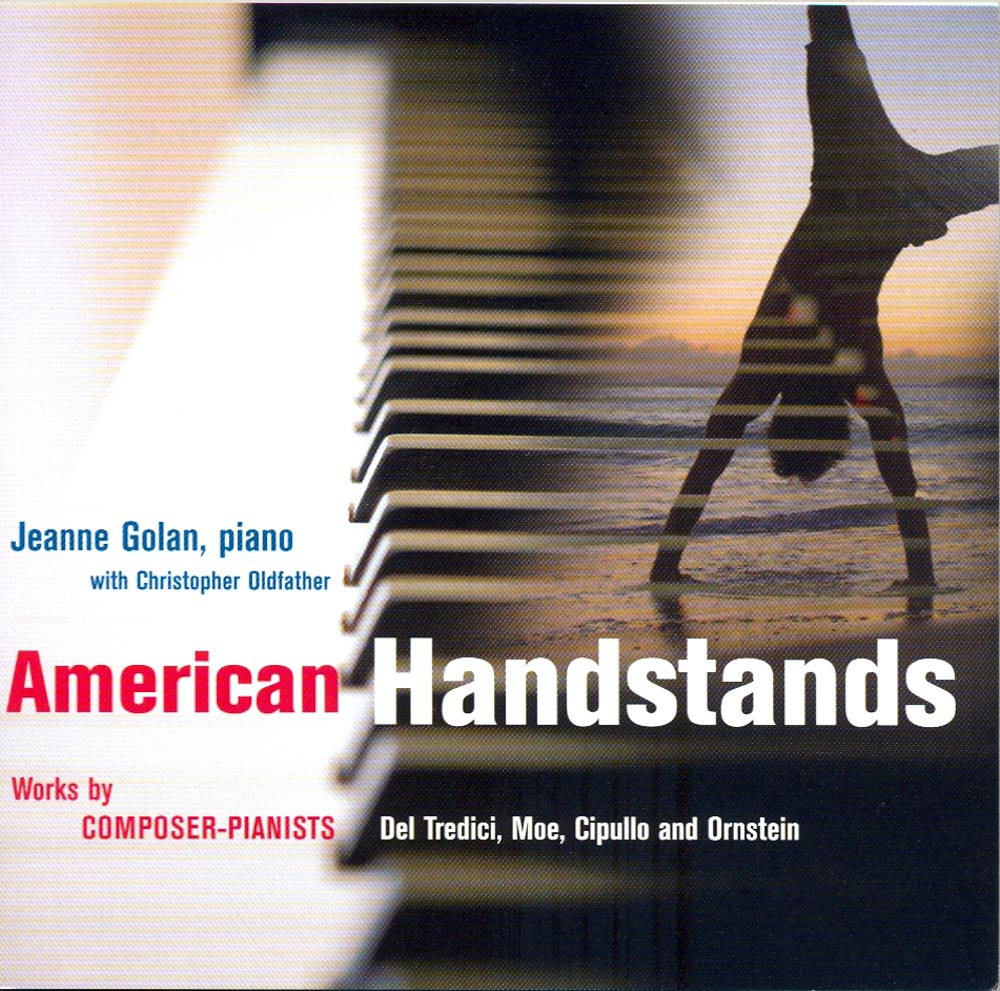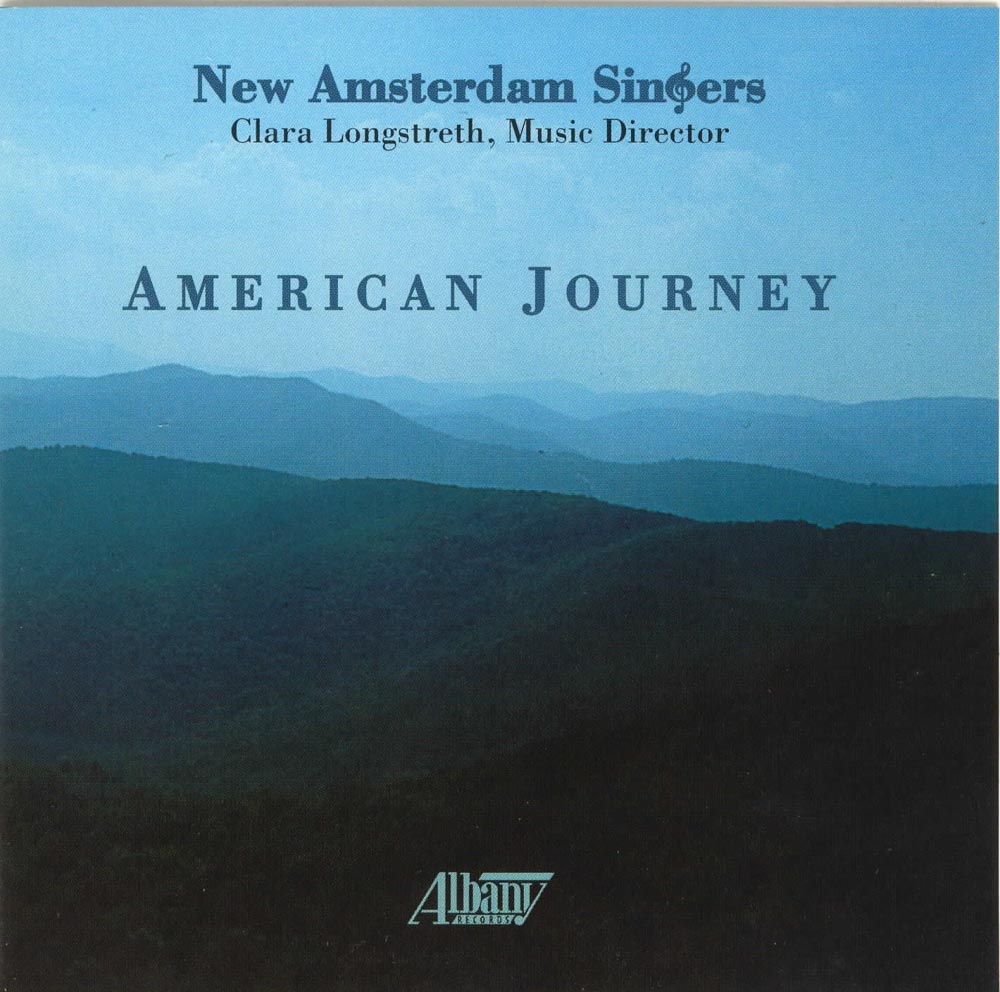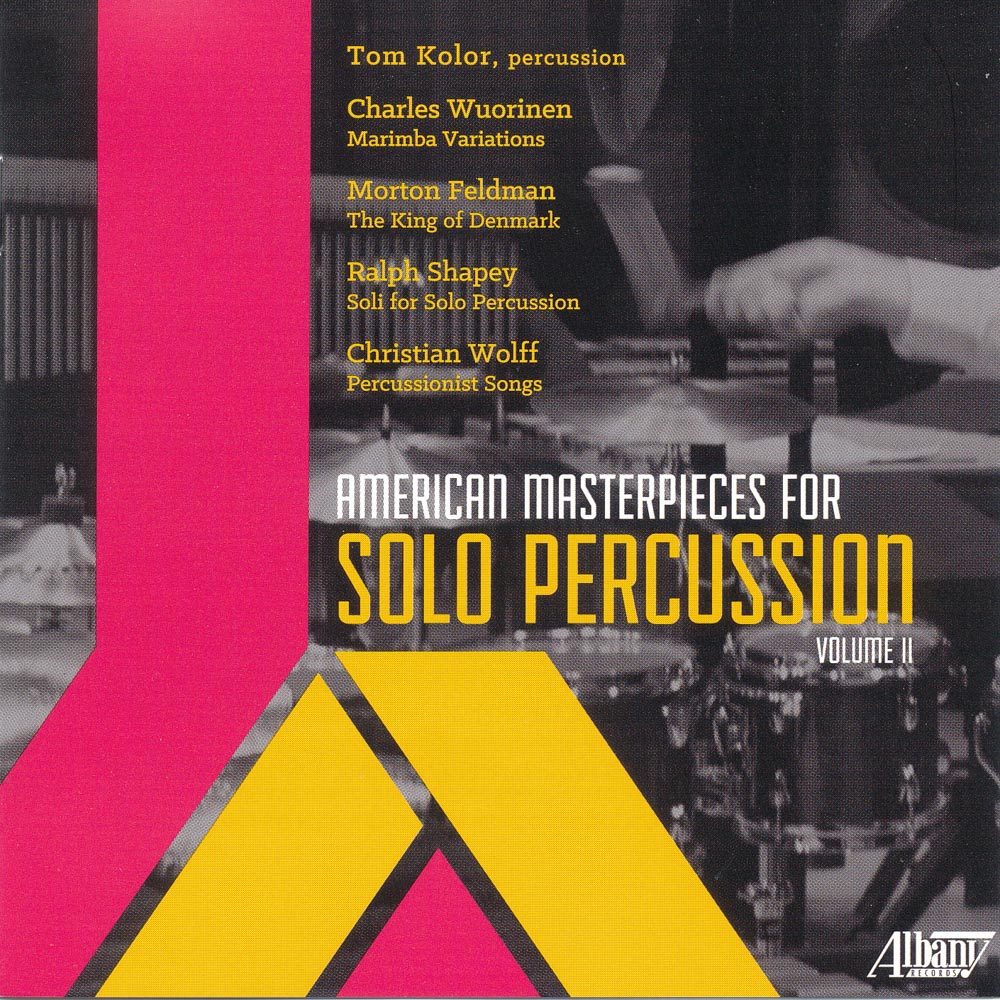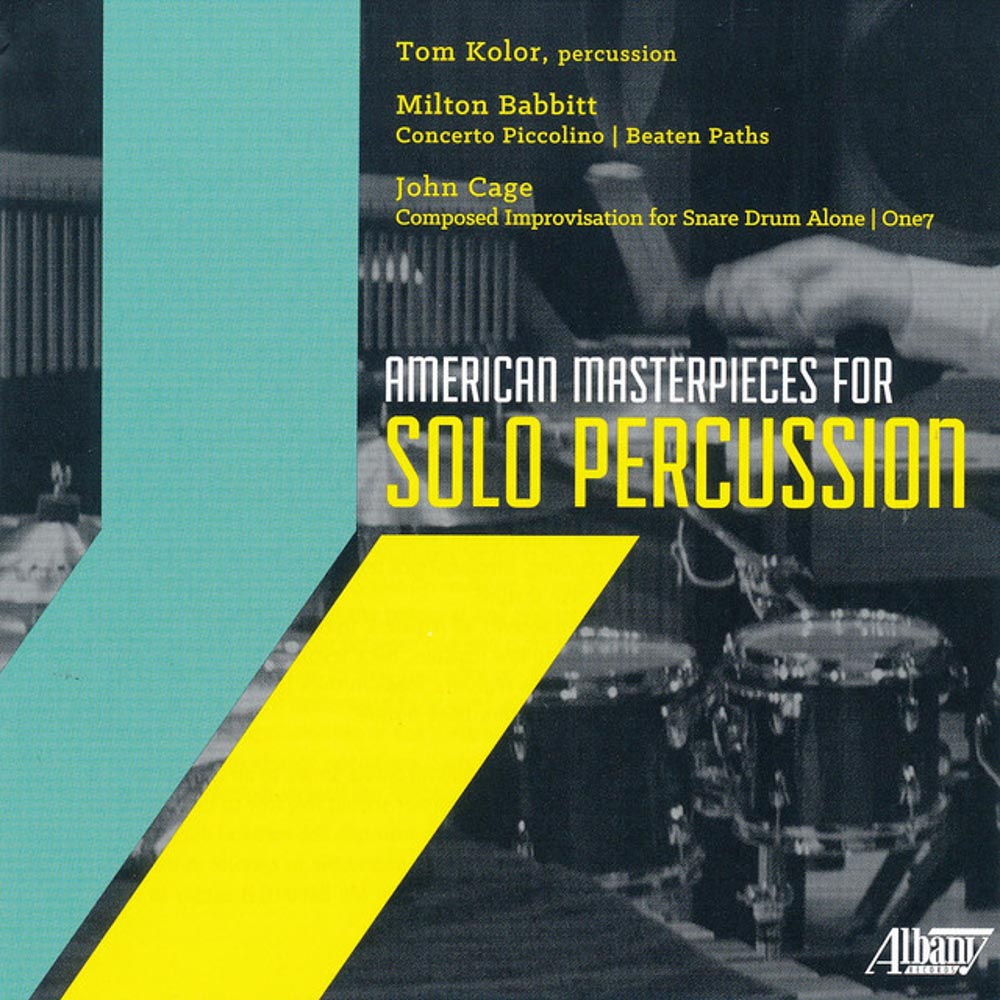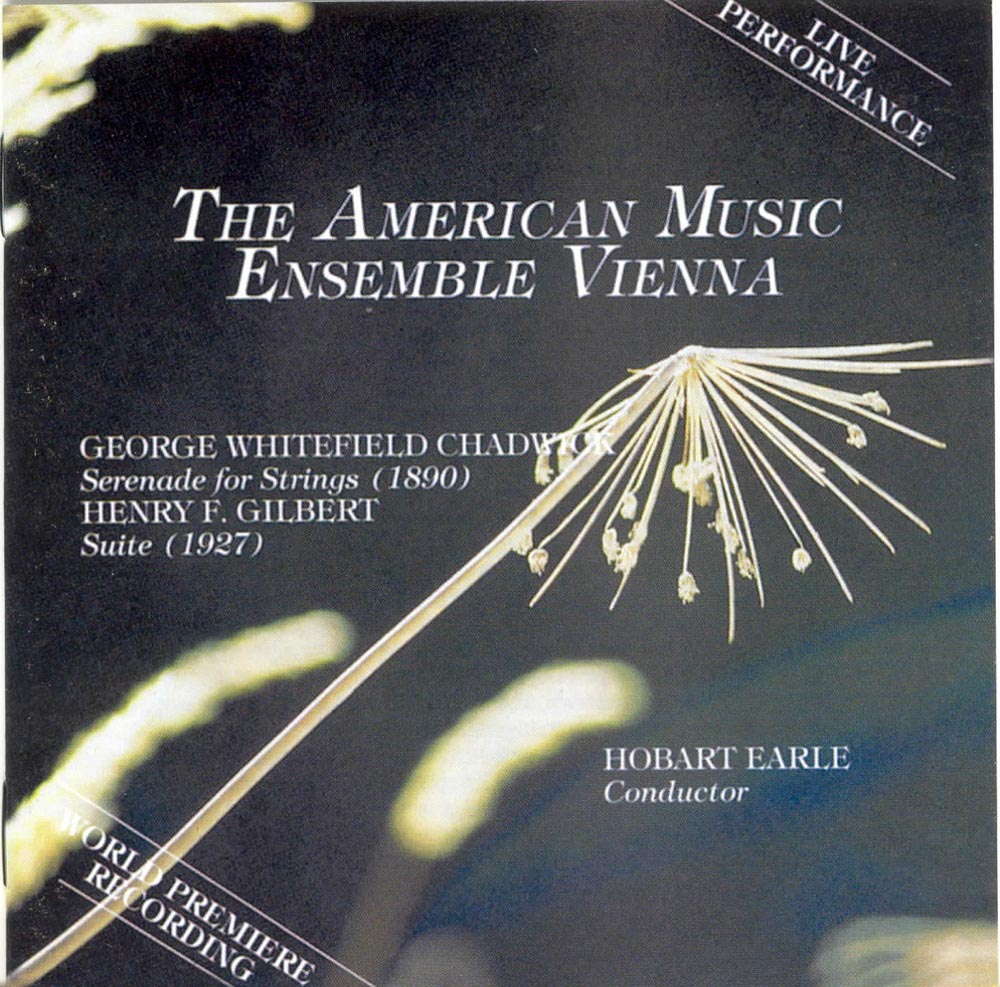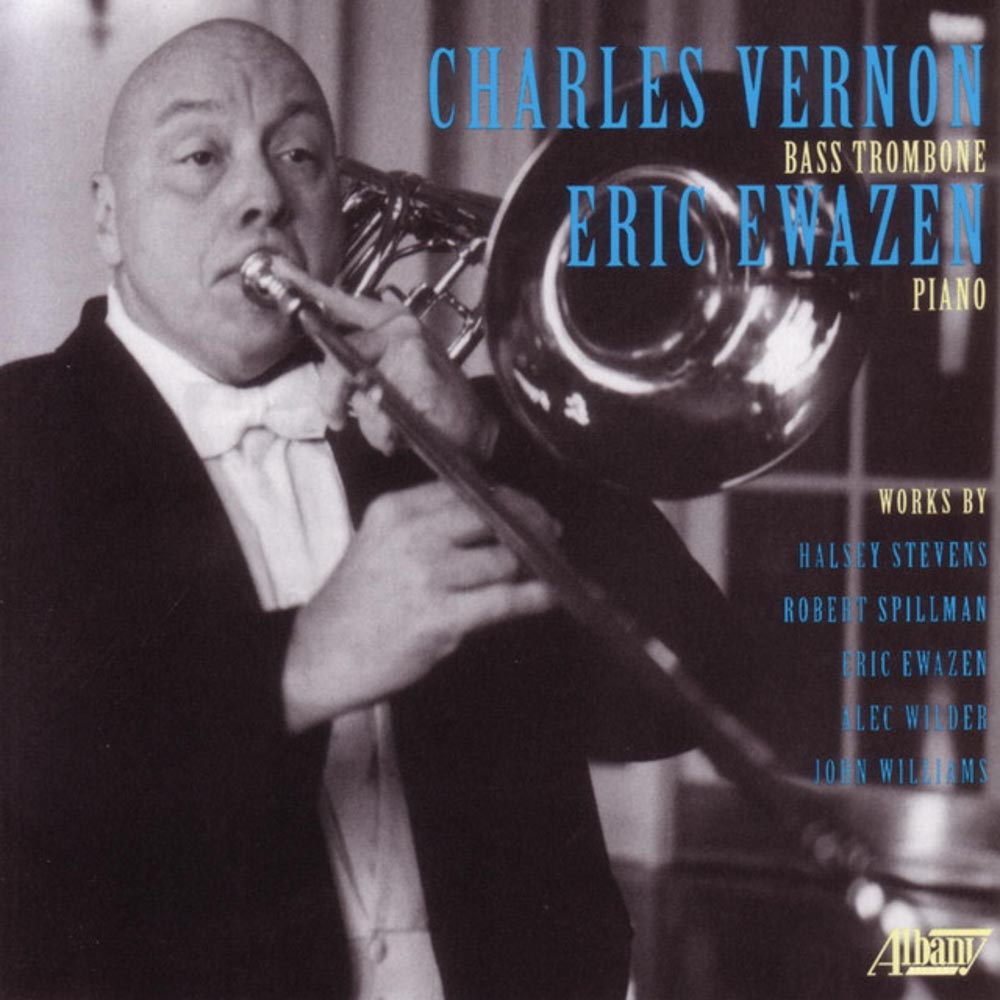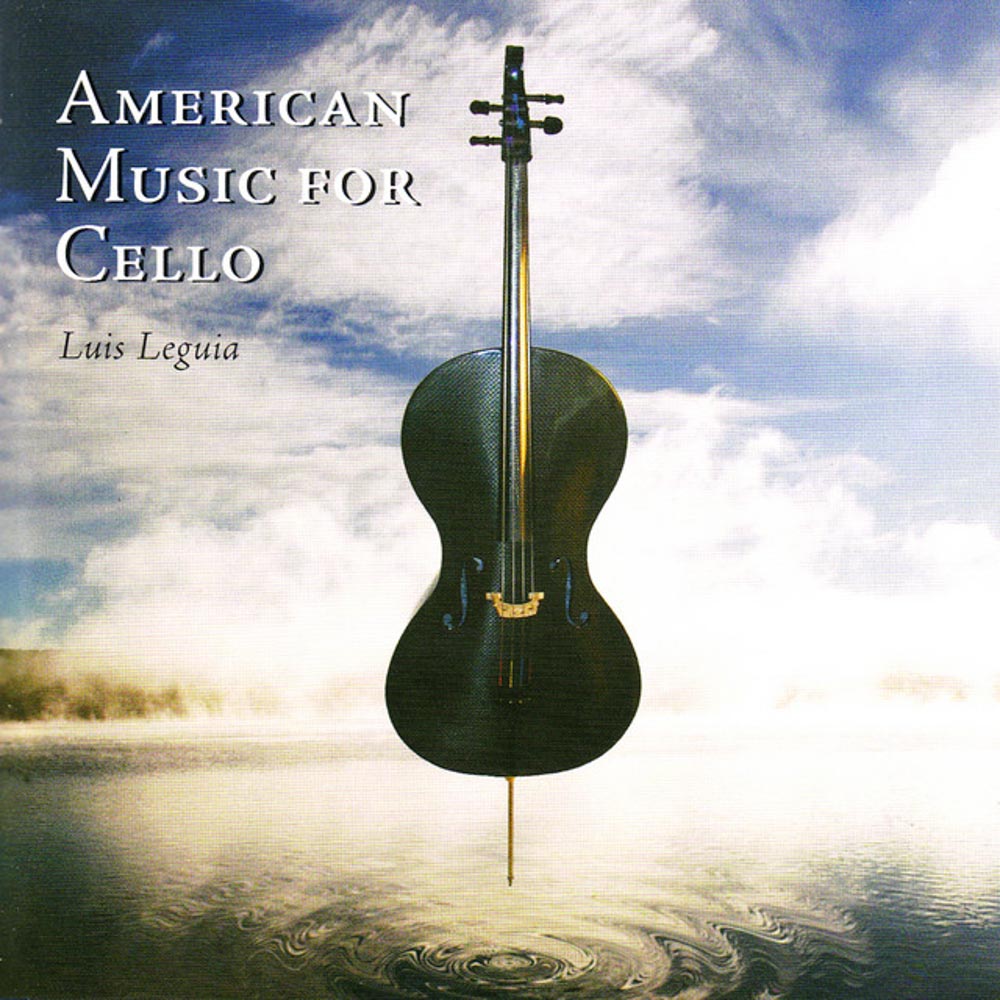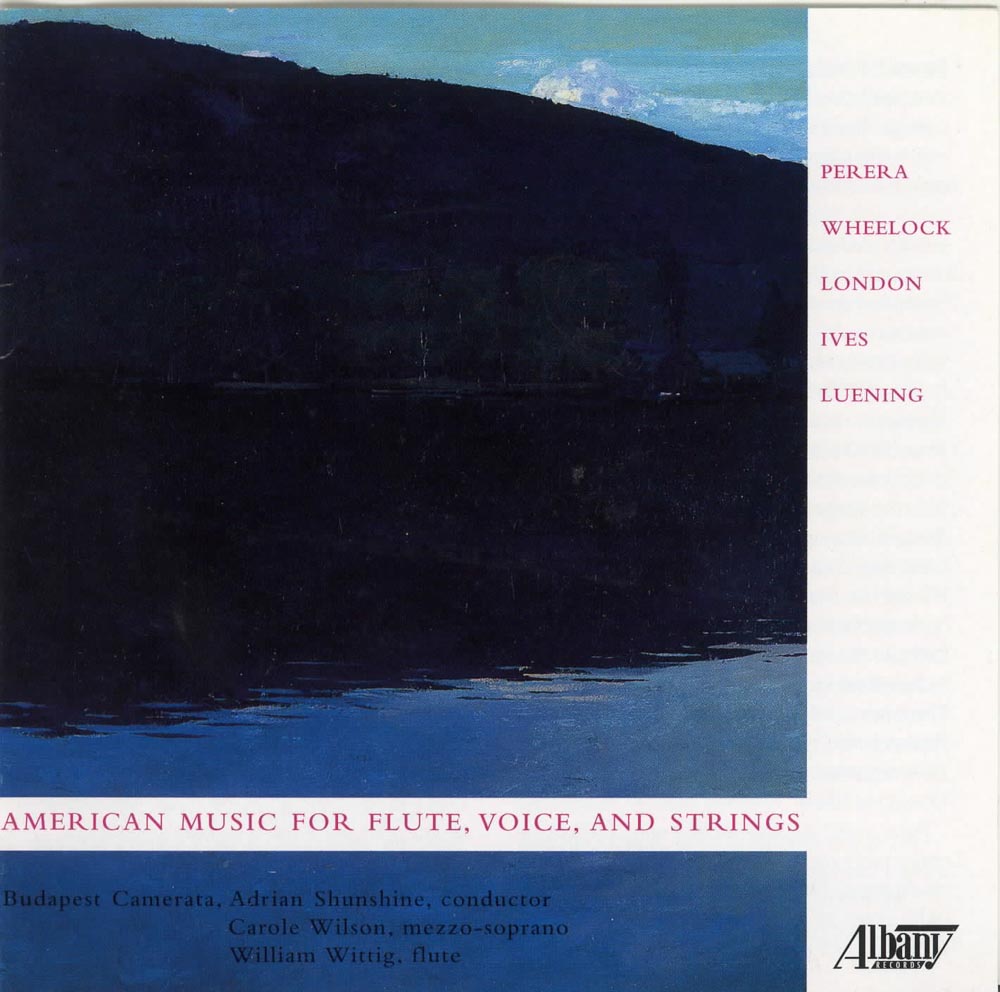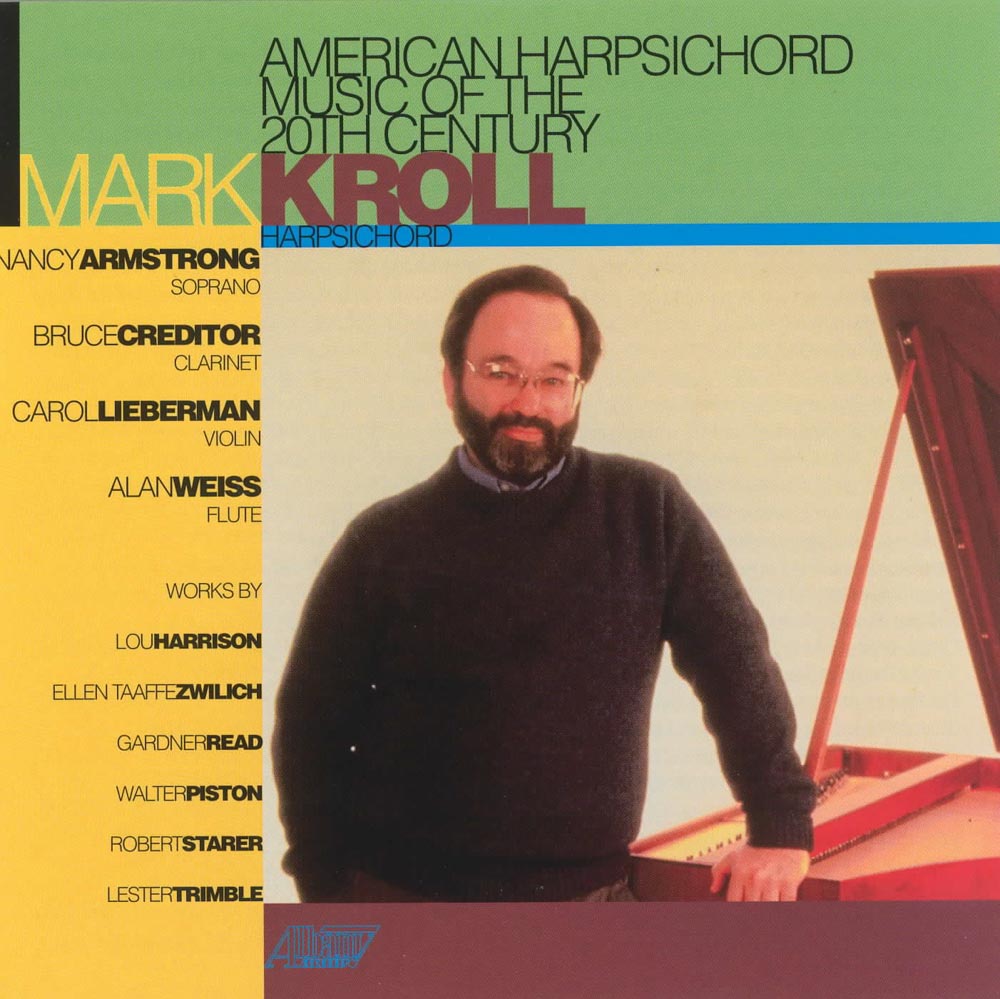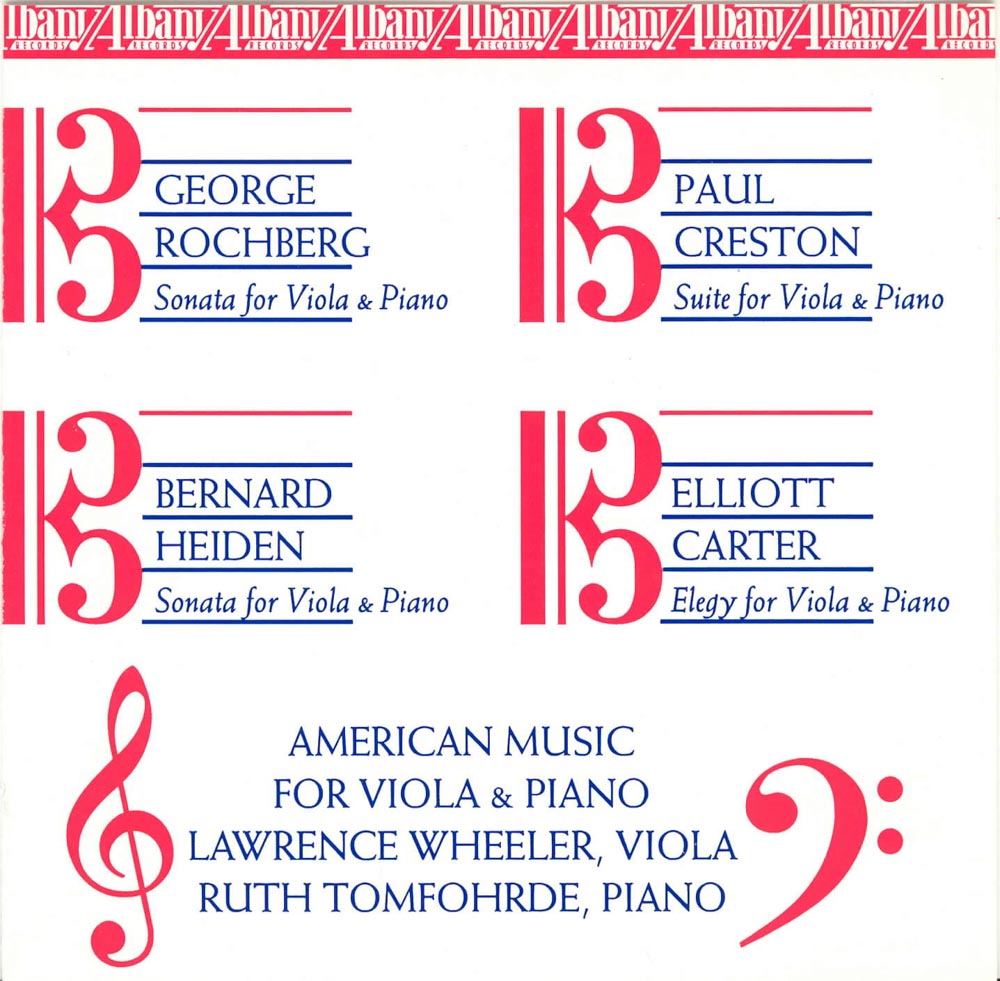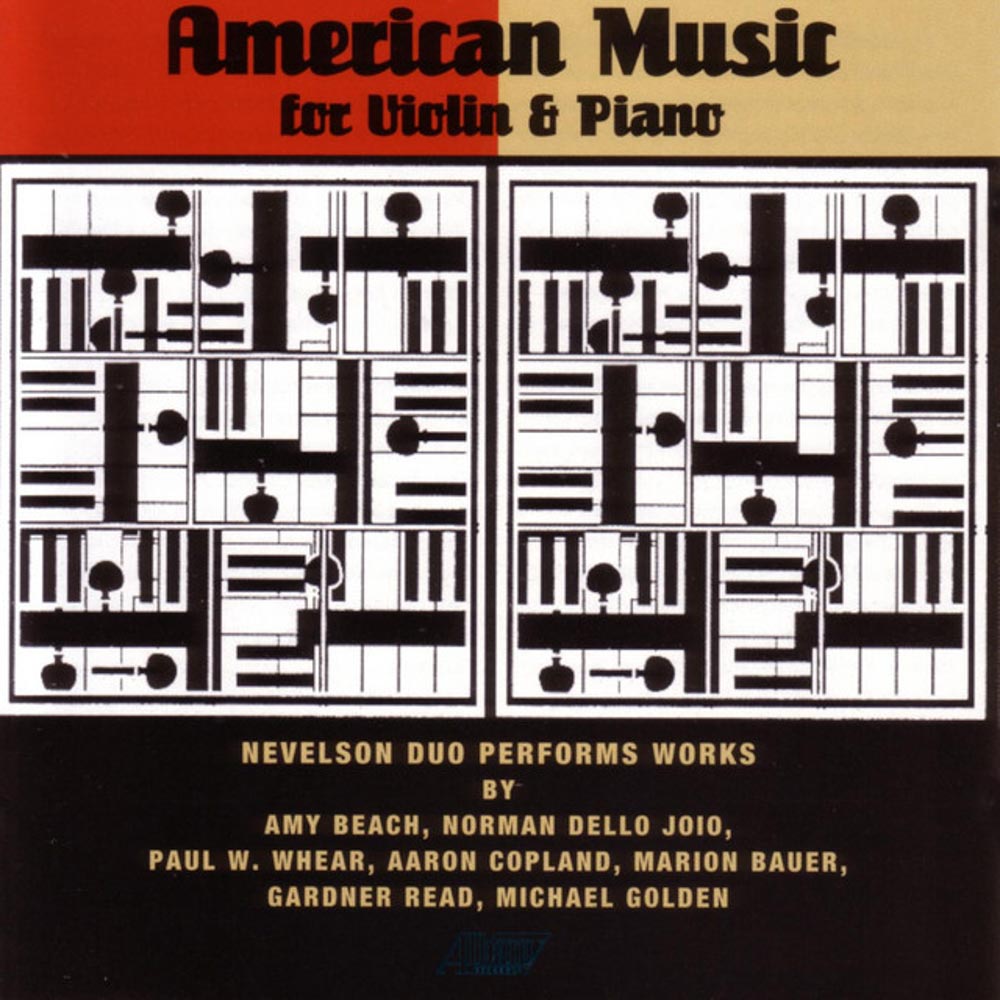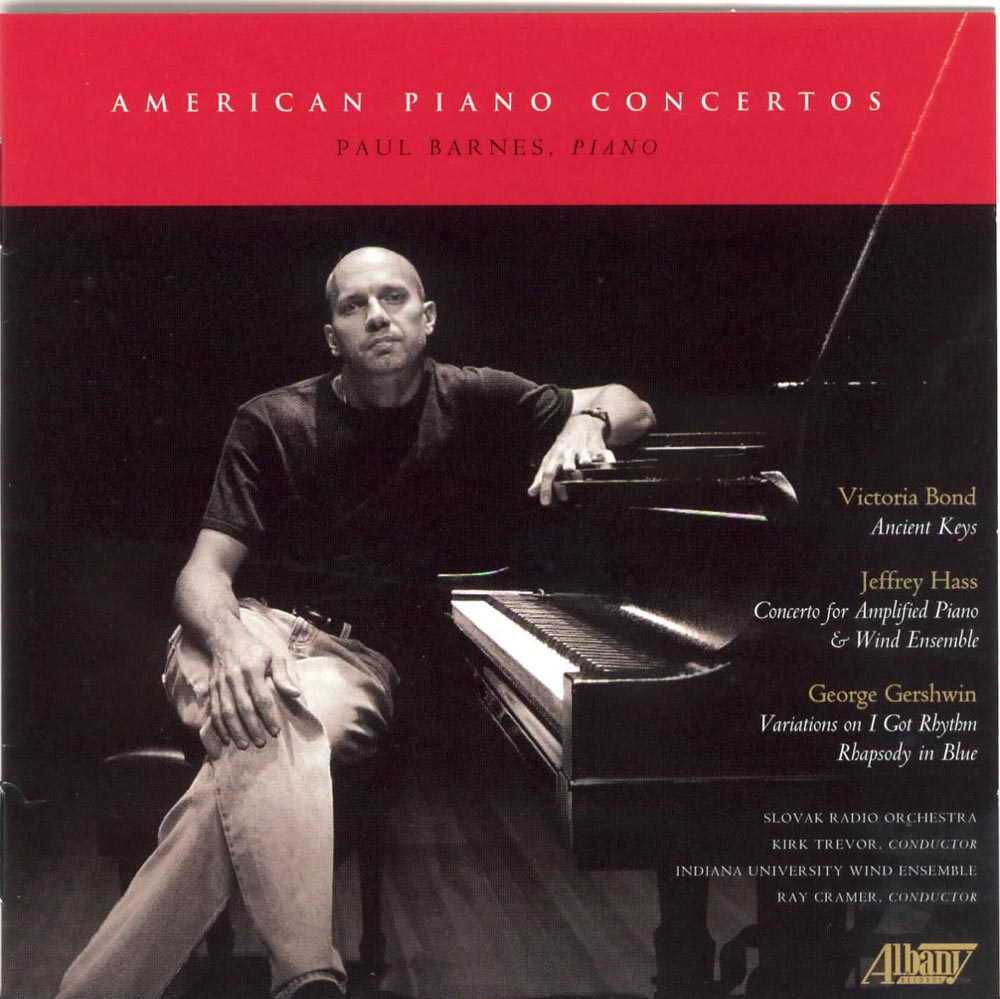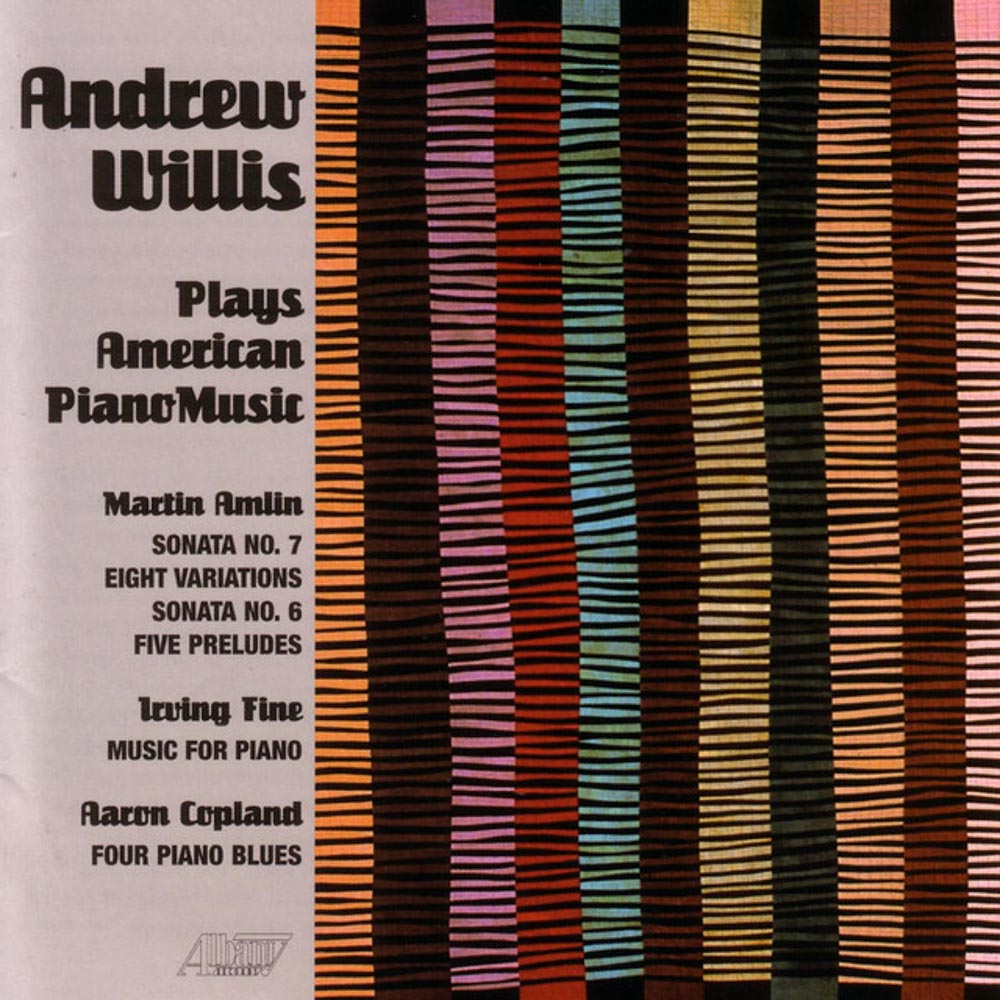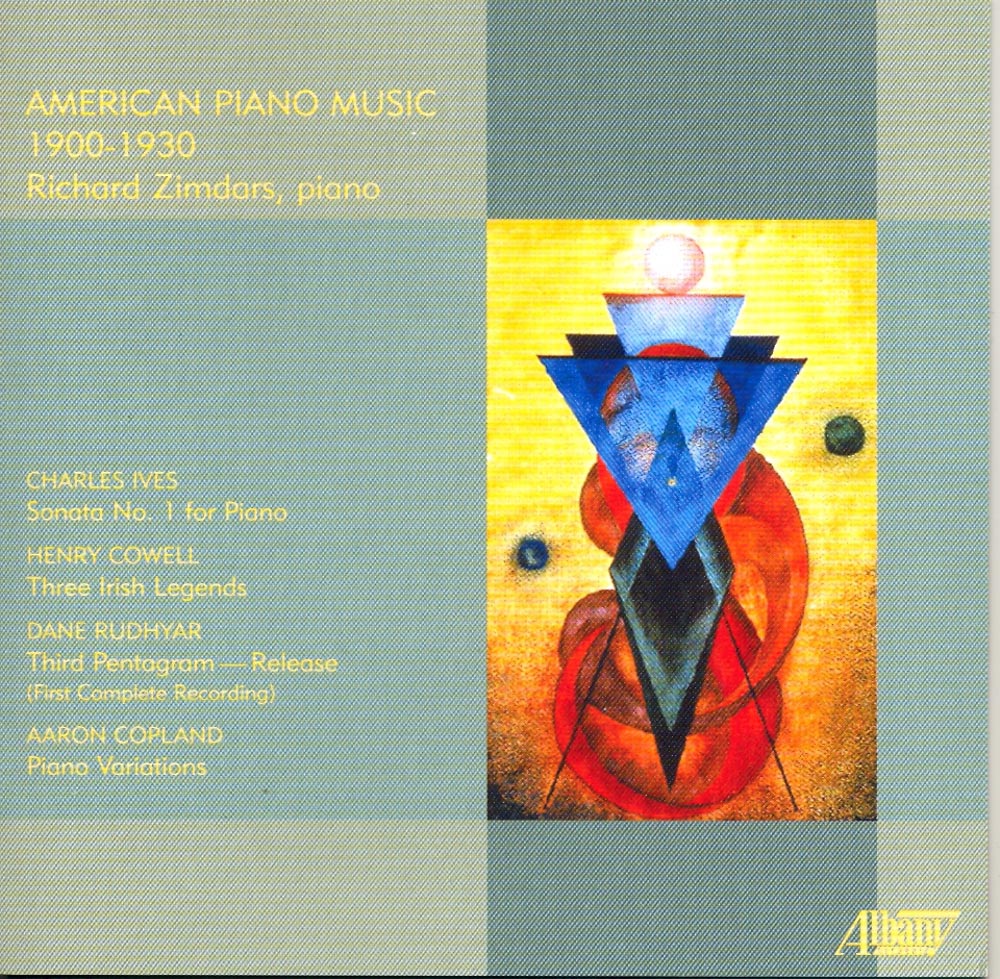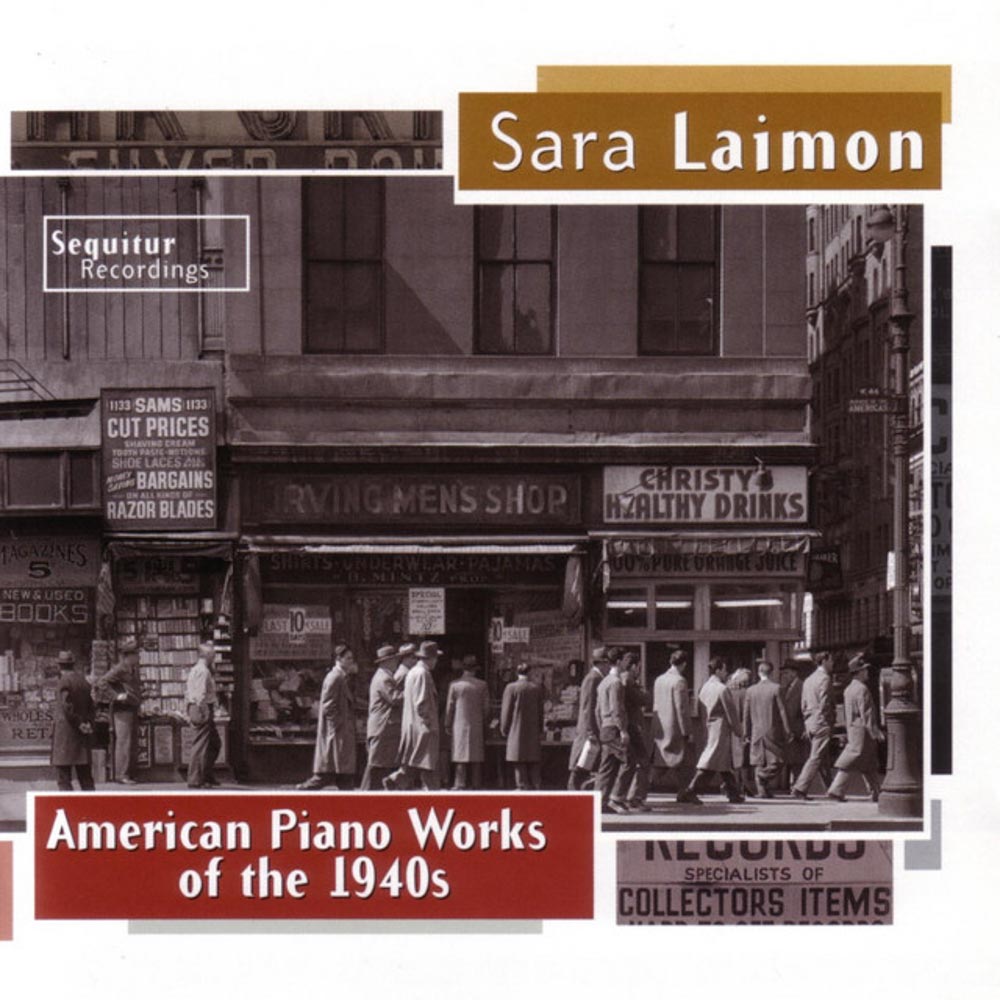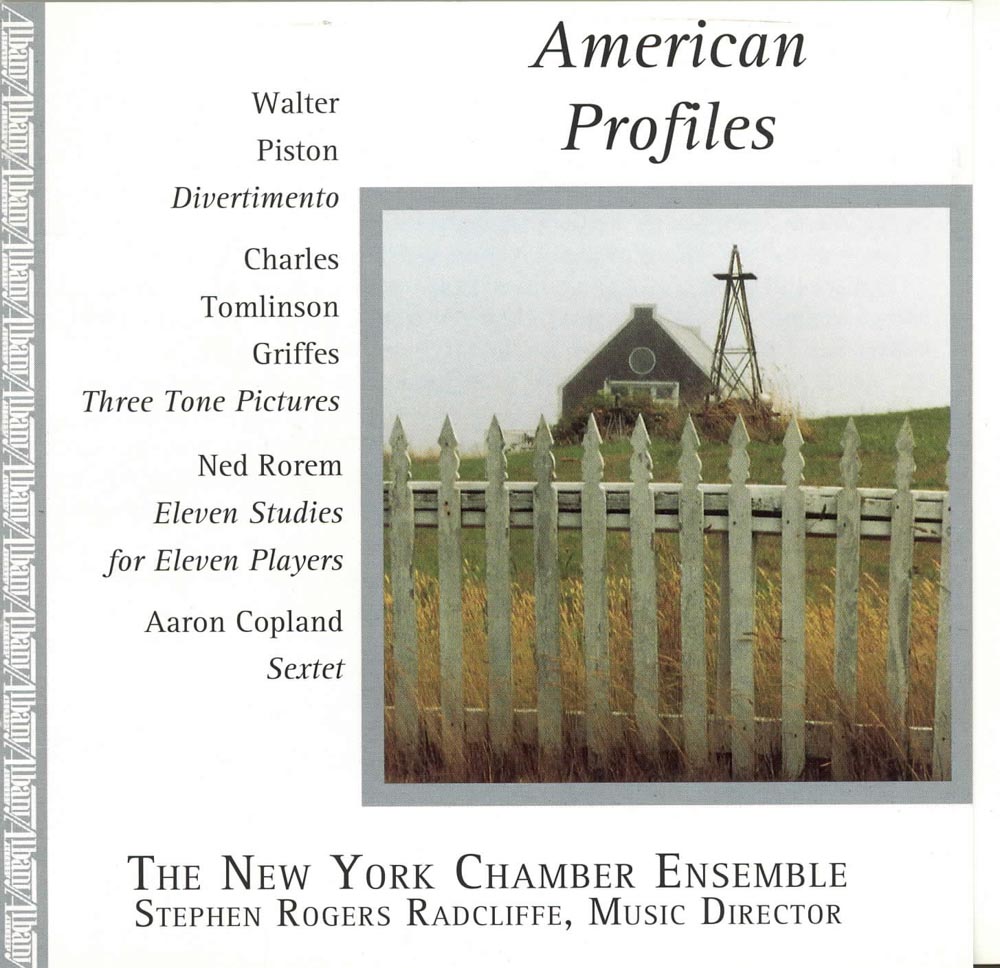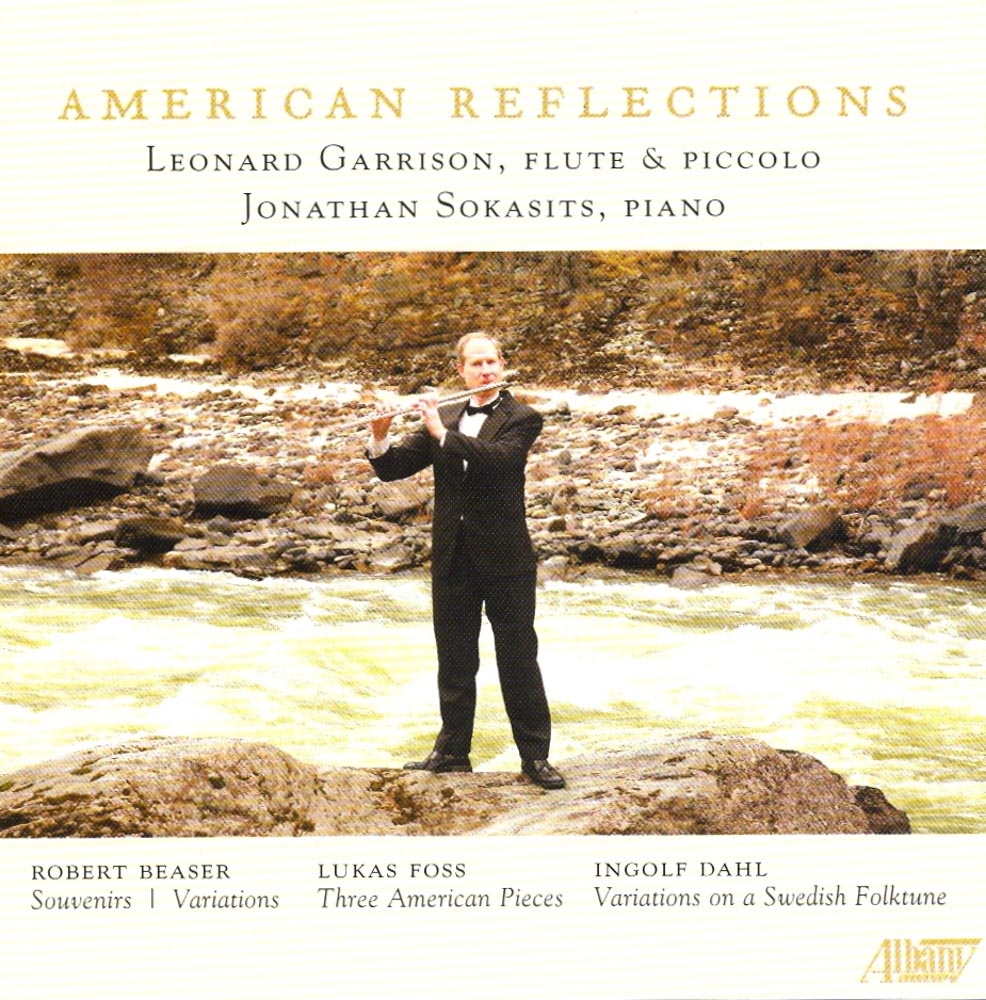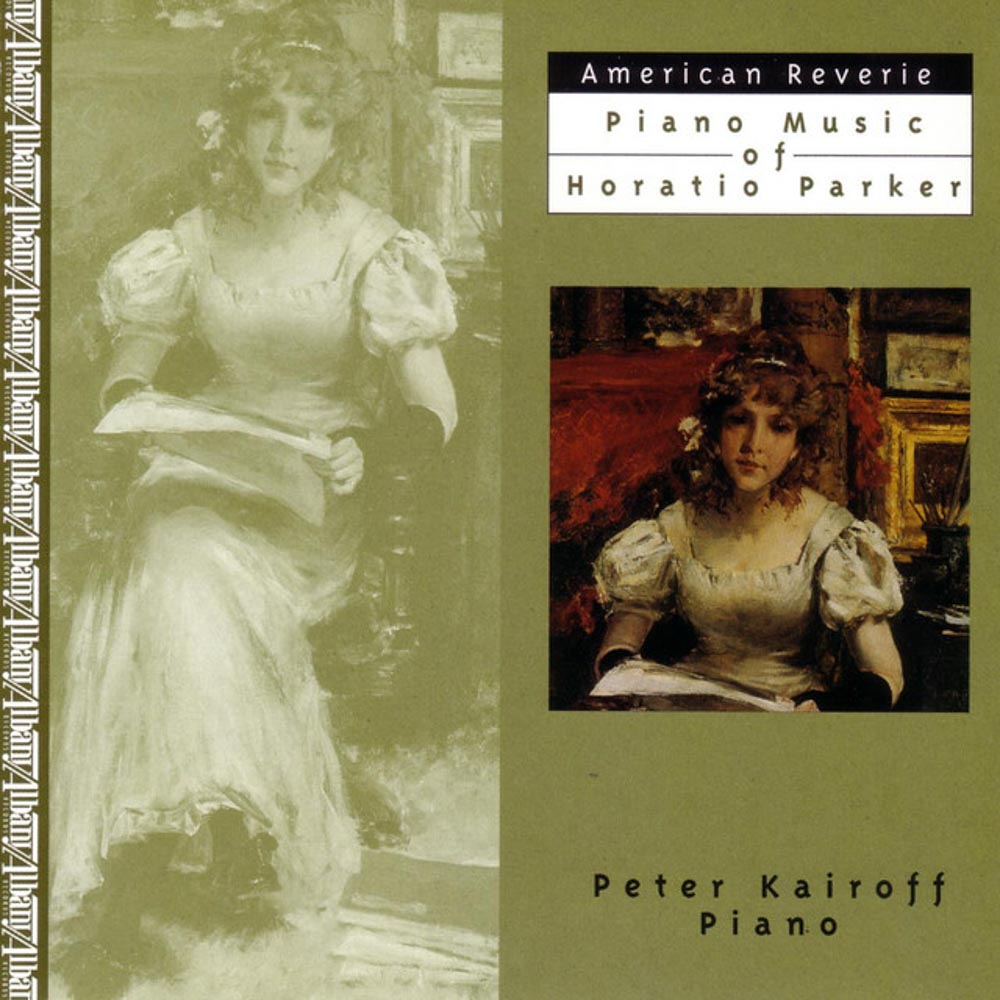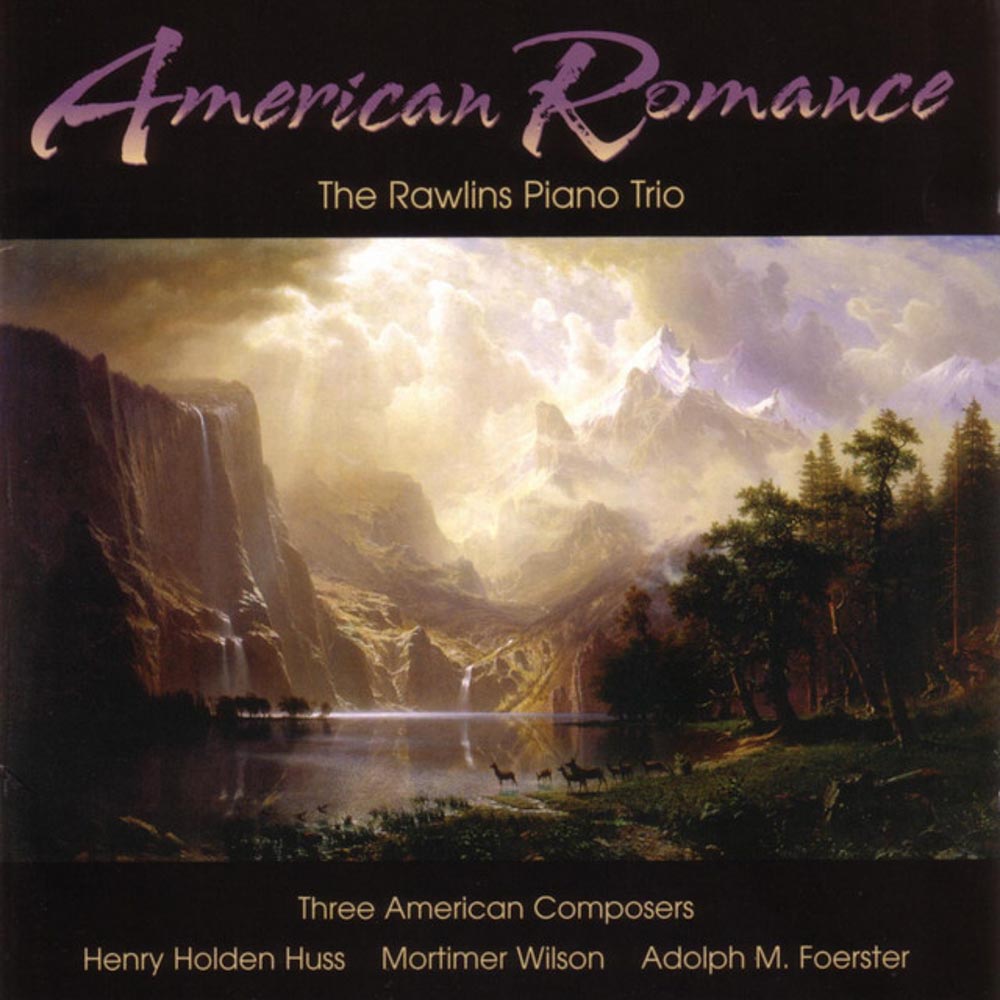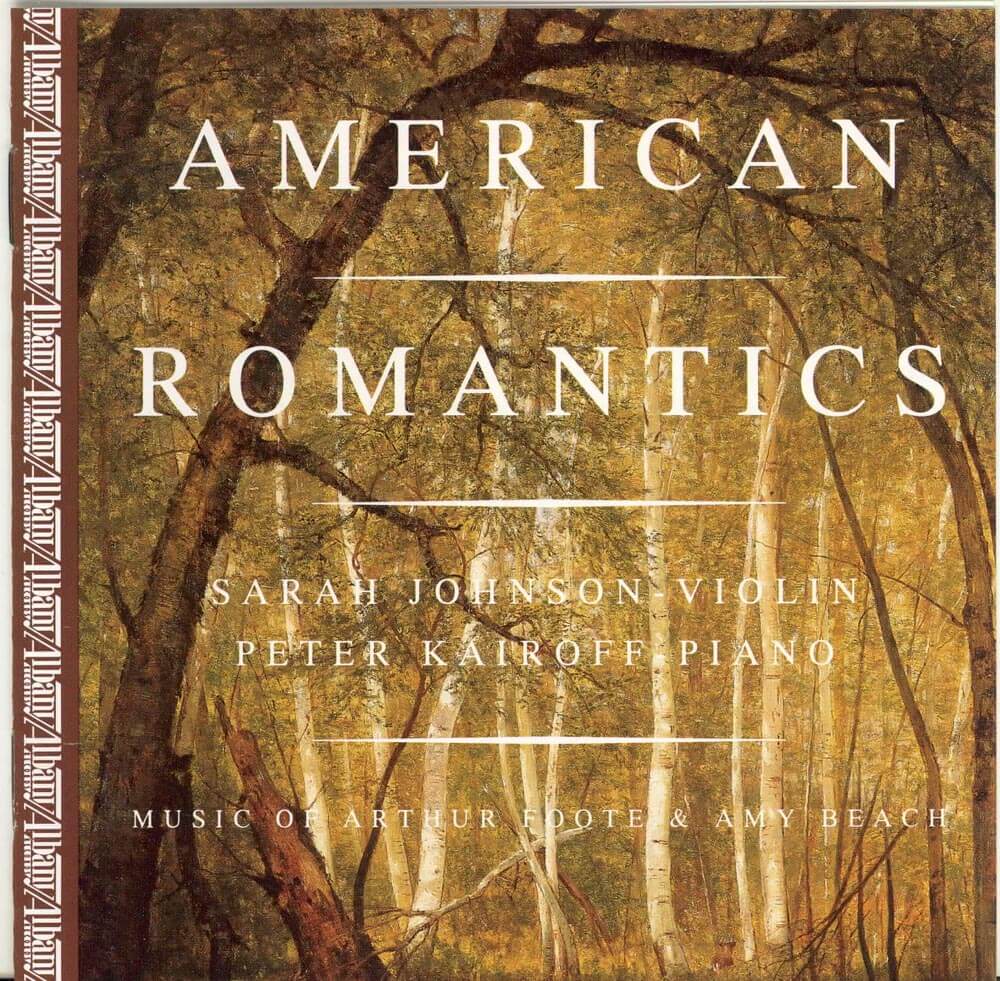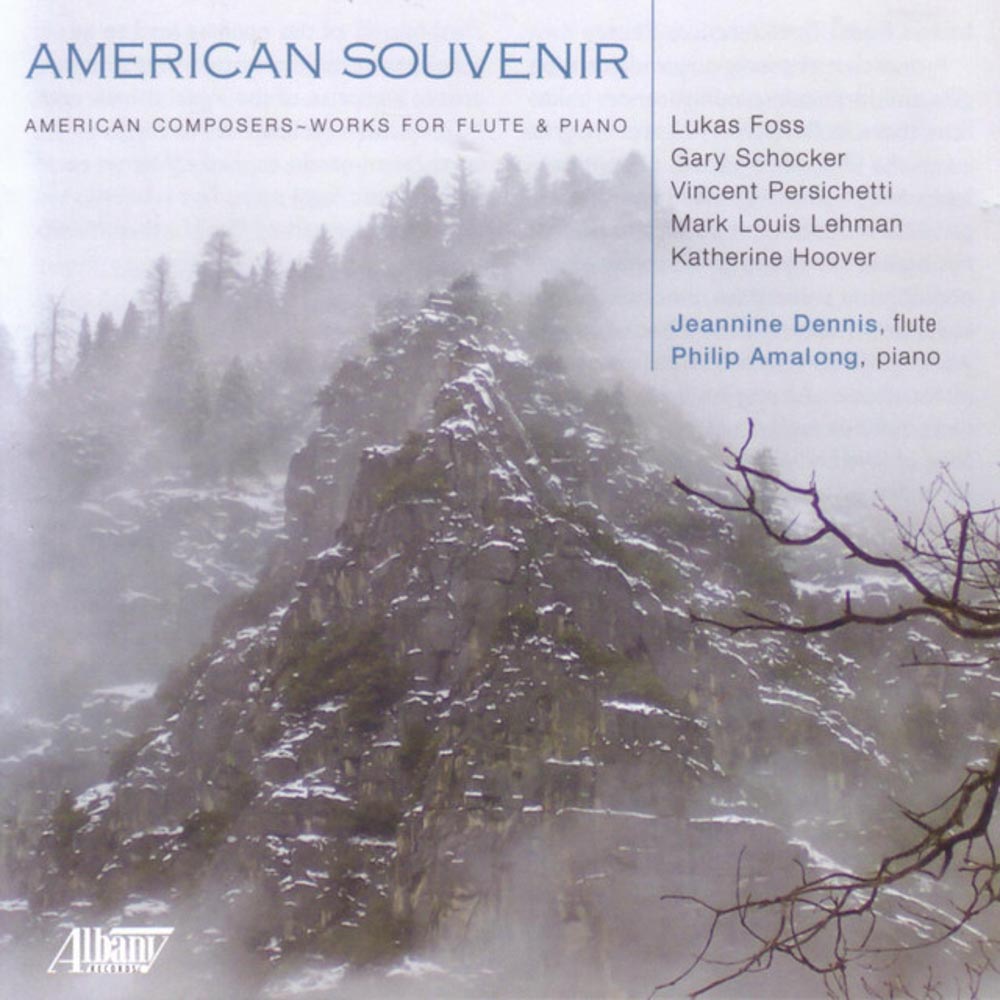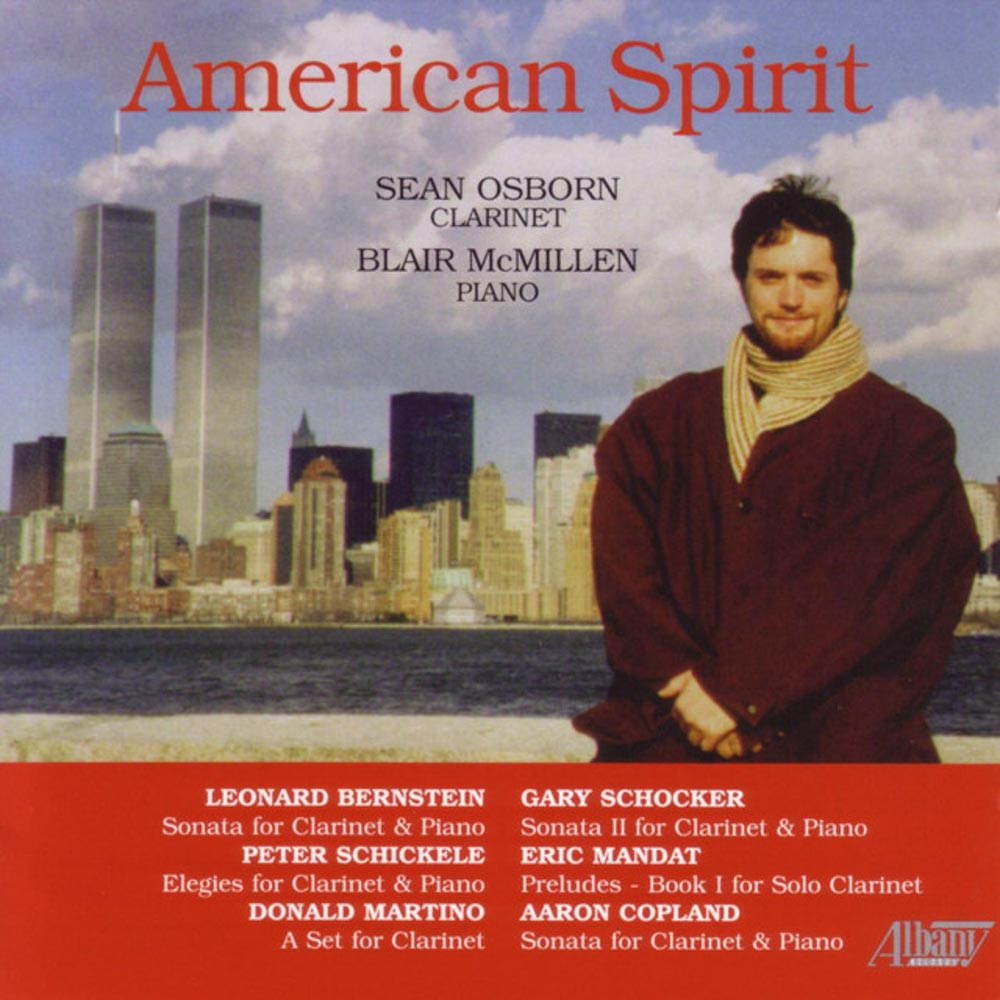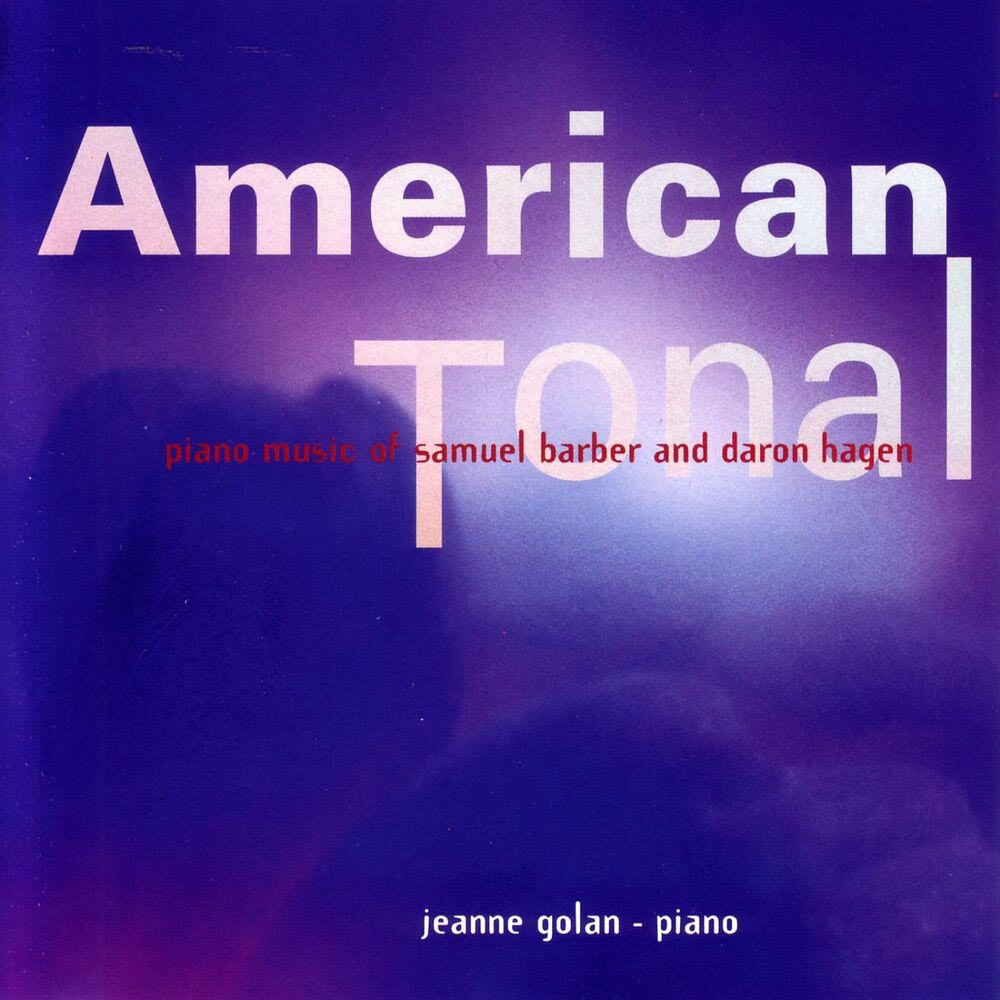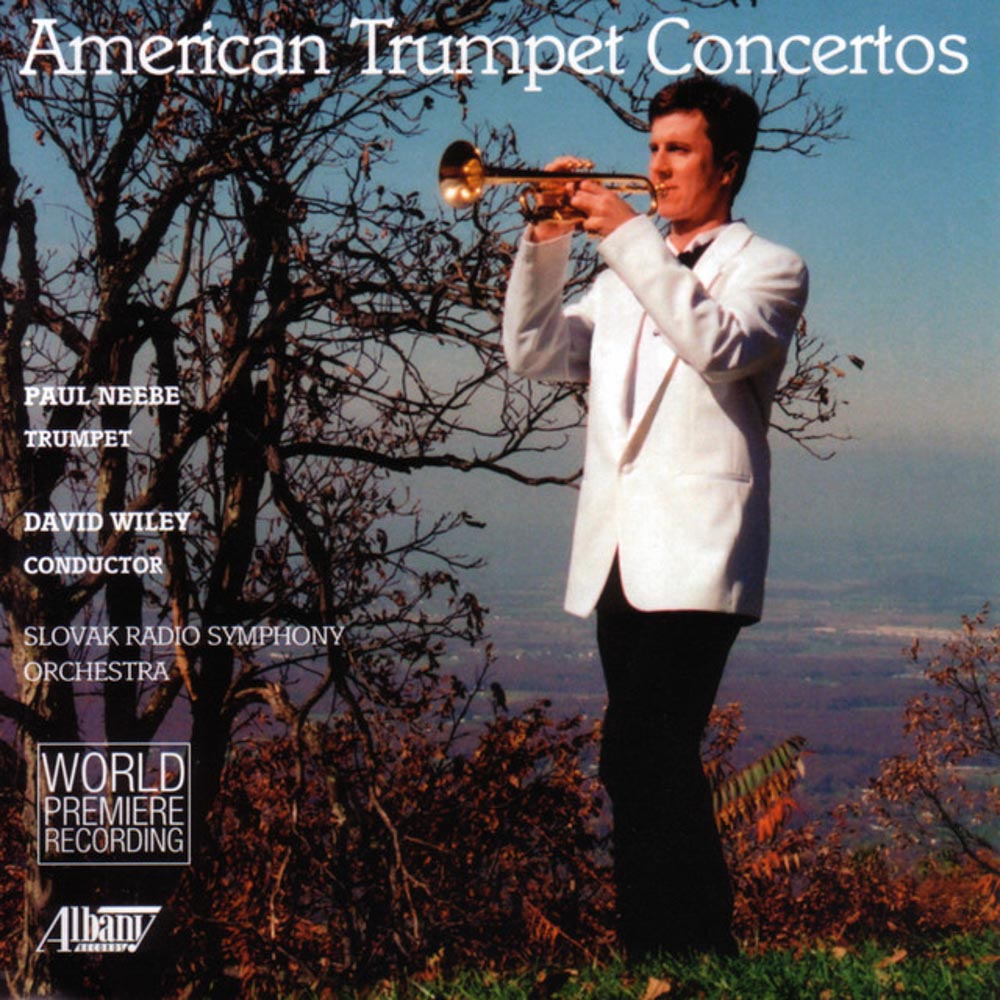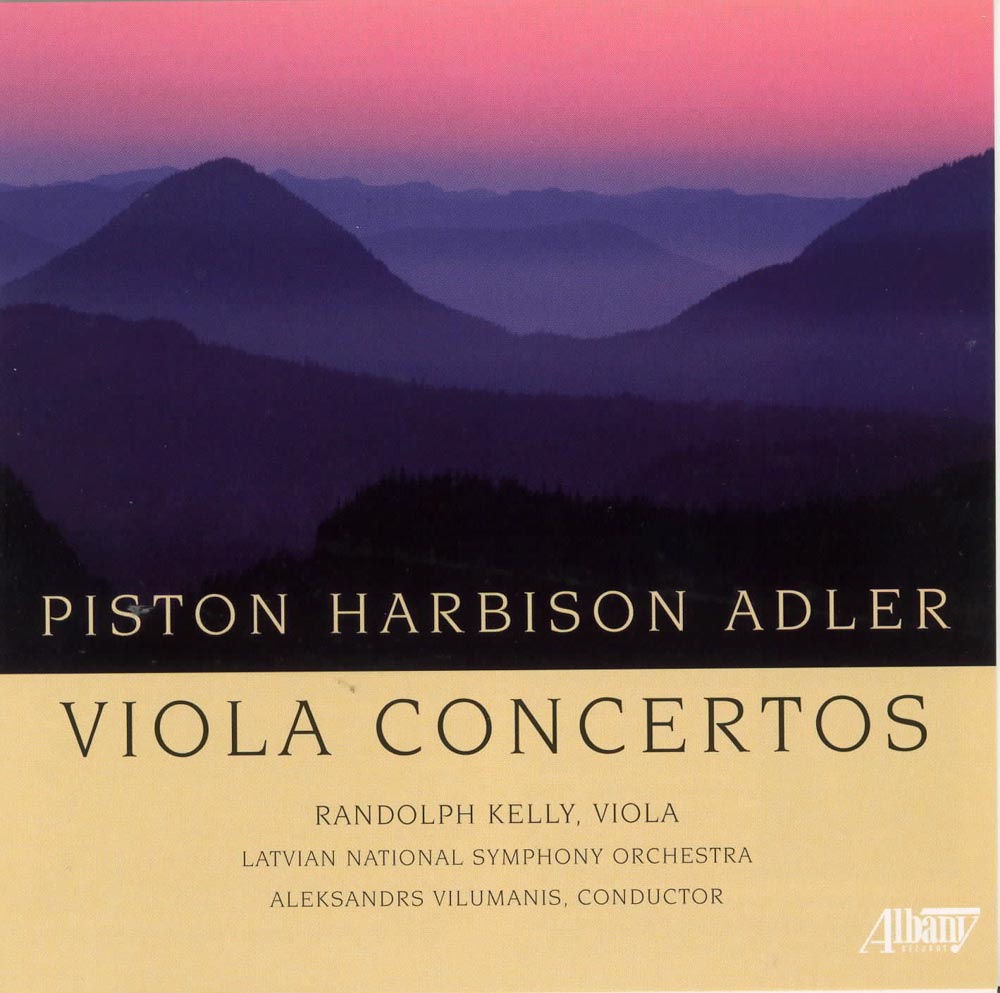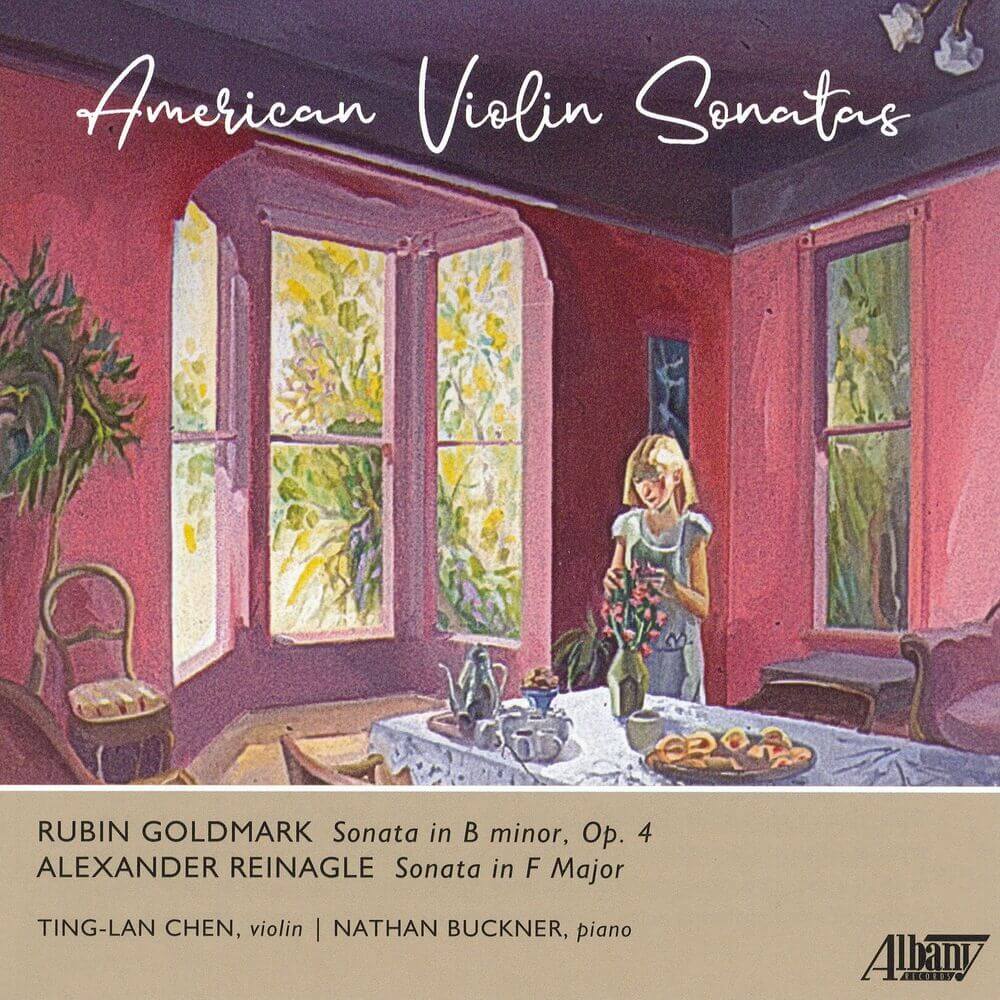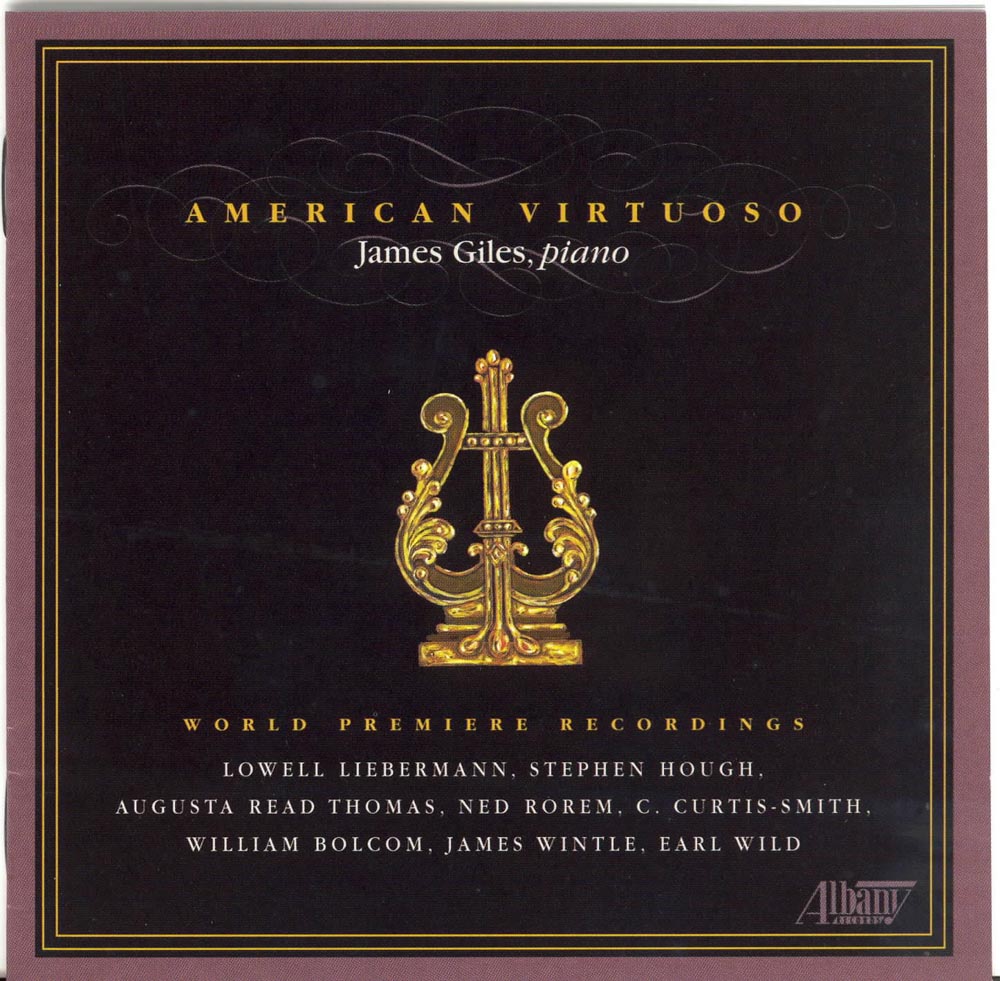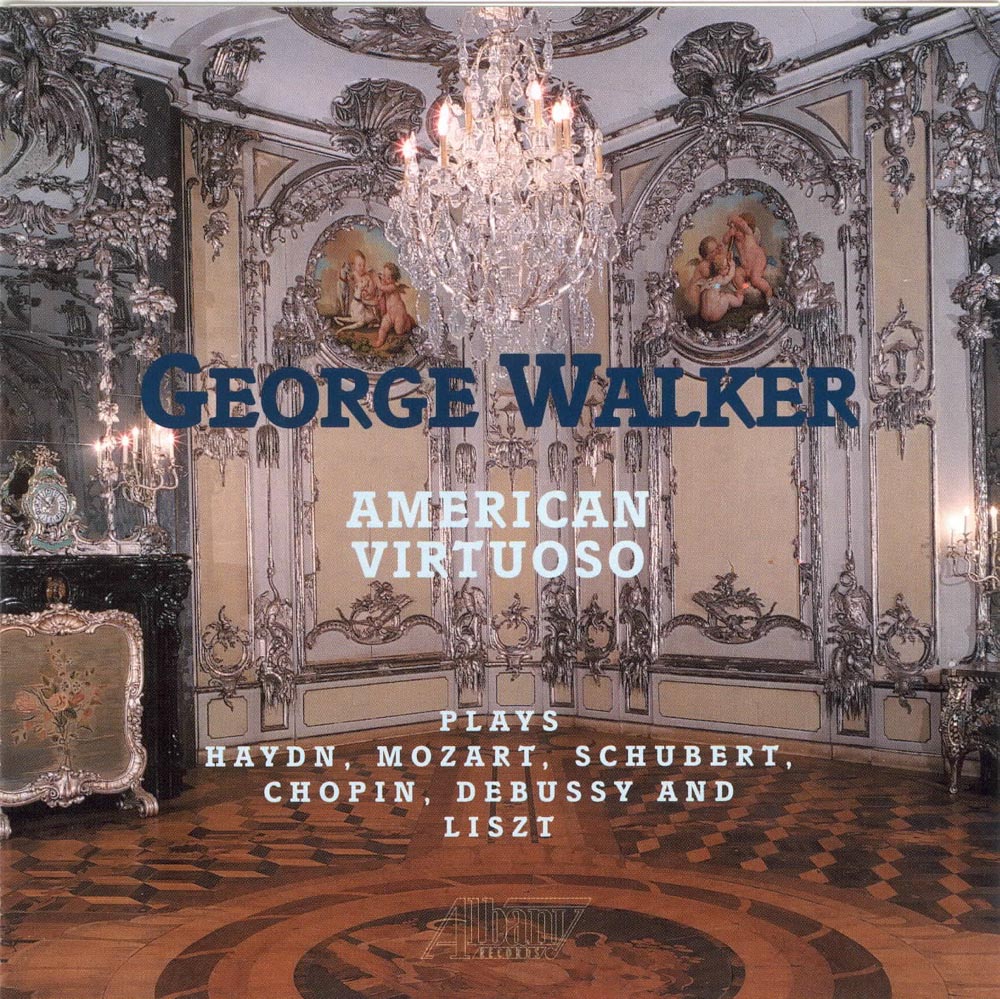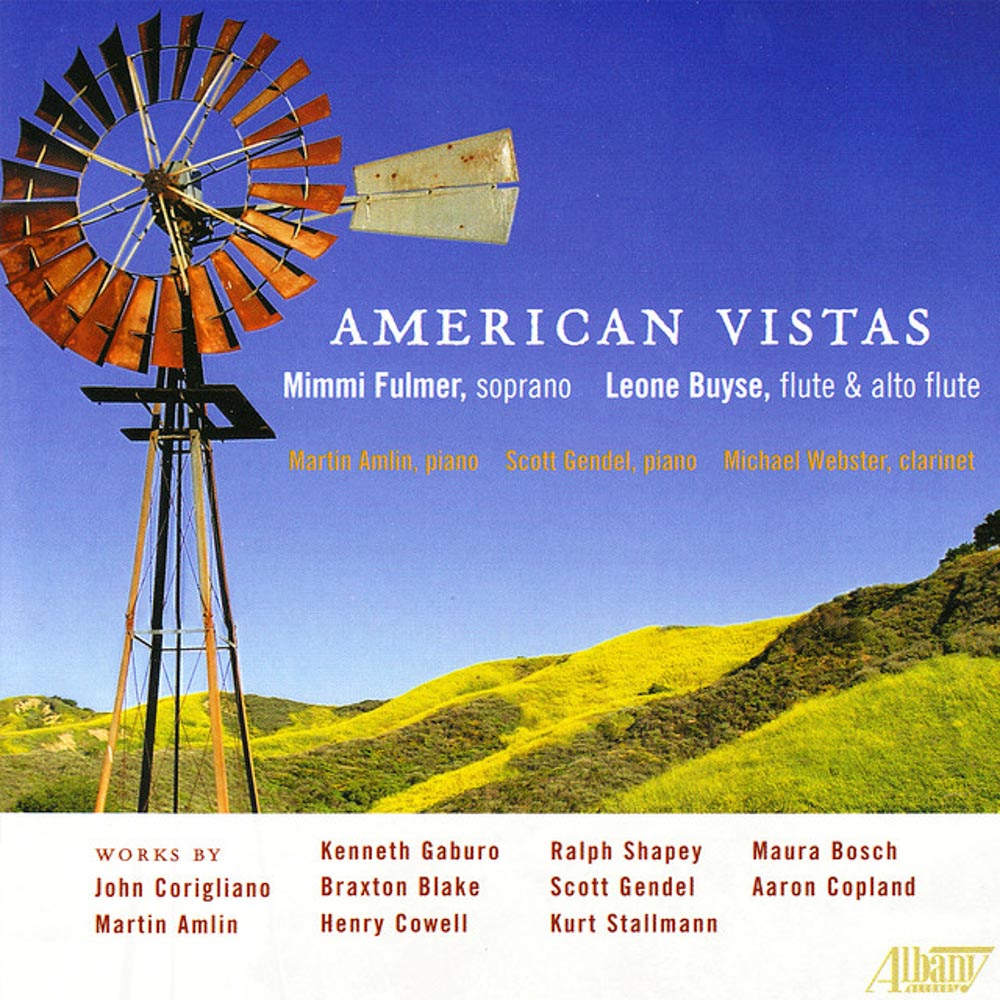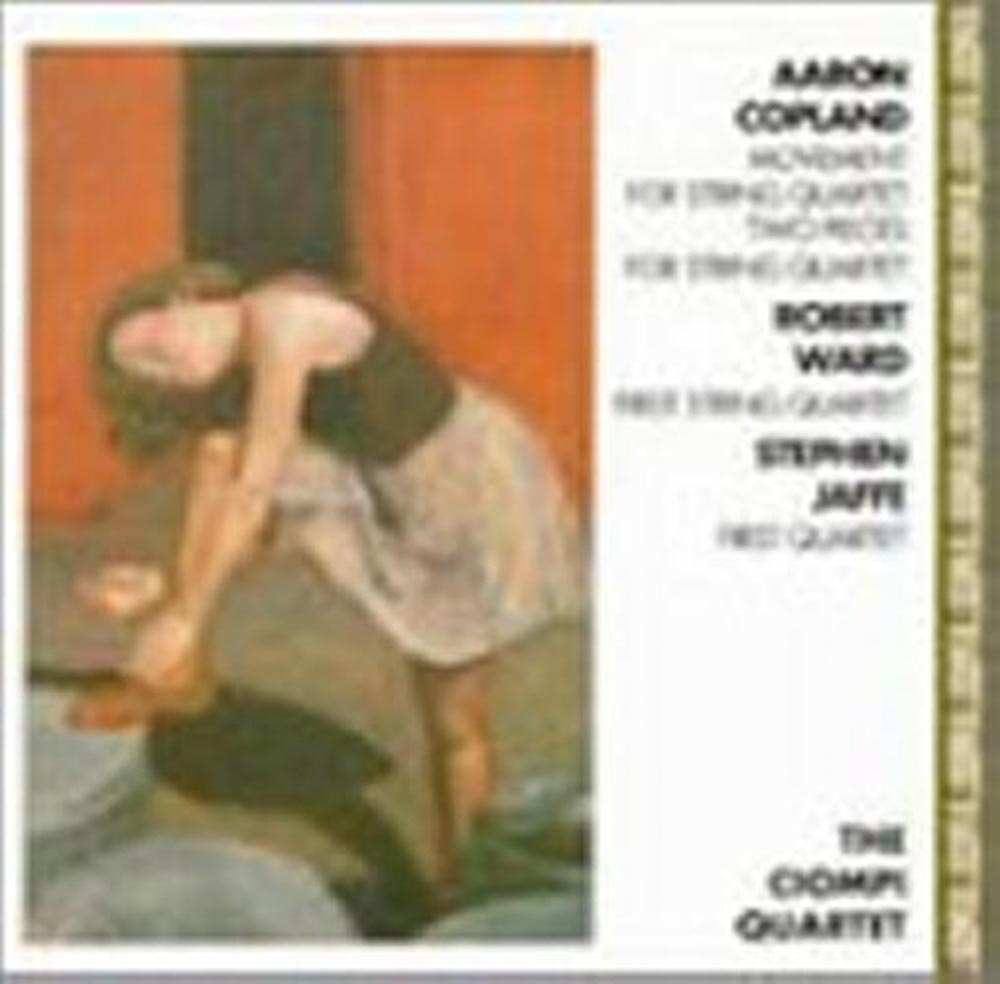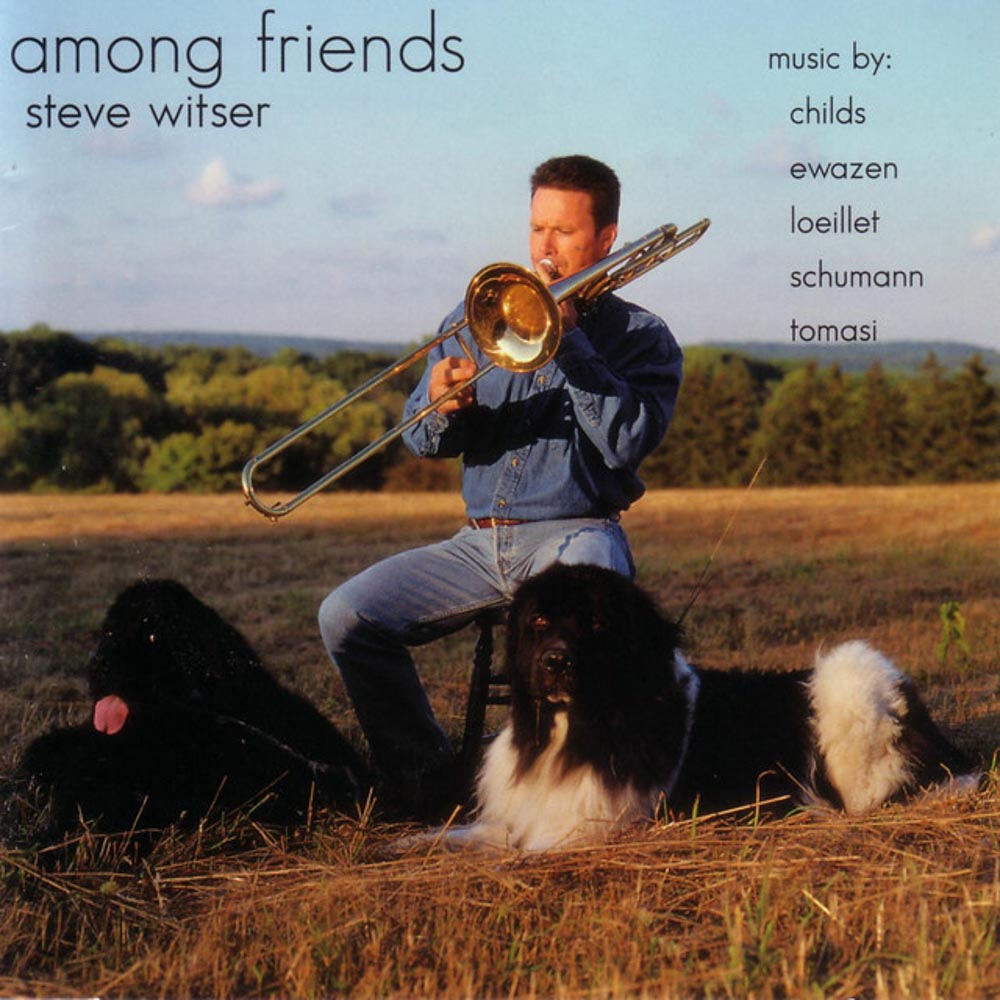Catalog #: TROY1154
Release Date: November 1, 2009InstrumentalJeanne Golan gives us performances of music by American composer-pianists who understand and write beautifully for the piano, making a collection that ranges from the virtuosic to the introspective. With American Hand Stands, pianist Jeanne Golan continues her active involvement in the fostering of works by new composers and discovering relatively unknown musical treasures.
Catalog #: TROY0108
Release Date: December 1, 1993ChoralThe twentieth-century American composers chosen for this program of choral music represent diverse styles and span almost 100 years; what they have in common is a sure sense for vocal writing, a preference for nontraditional but tonal harmony, and a delight in good poetry. The Composers: Halsey Stevens has taught at the University of California since 1948. He is an expert on Bartok and has composed a wealth of vocal and instrumental music. Charles Ives, New England's quirky, original insurance man-composer, began composing when he was 12 and held a job as church organist when he was only 14. Samuel Barber's gift for melody and the unabashed romanticism of some of his best-known works have made him one of the most popular mid-twentieth-century composers. Alan Hovhaness is an American composer of Armenian and Scottish descent. A prolific writer in a variety of forms, he is known for mystical works with an Eastern or Oriental flavor. Randall Thompson taught at the University of California at Berkley, Princeton, and Harvard, and was director of the Curtis Institute of Music. Ronald Perera studied with Leon Kirchner, Randall Thompson, and Mario Davidovsky. He has won awards and fellowships from the National Endowment for the Arts and ASCAP and teaches at Smith College. Matthew Harris, born in 1956, studied at Juilliard, Harvard, and New England Conservatory with Elliott Carter, Roger Sessions, Milton Babbitt, and Donald Martino. The recipient of many prizes and commissions, he is represented on record by Opus One. Irving Fine - teacher, conductor, respected and widely programmed composer of chamber, orchestral, and choral music - was educated at Harvard and later taught there and at Brandeis University. A contemporary of Leonard Bernstein and Aaron Copland, he died prematurely in 1962.
Catalog #: TROY1578
Release Date: July 1, 2015InstrumentalAmerican Masterpieces for Solo Percussion Volume II continues the exploration by percussionist Tom Kolor of seminal works for percussion written in the 20th century by American composers. This disc contains works by some of the world's most noted composers including Charles Wuorinen, Morton Feldman, Ralph Shapey and Christian Wolf. A graduate of Juilliard, Tom Kolor is one of New York's most in demand chamber musicians. He regularly performs with the New York New Music Ensemble, Da Capo Chamber Players, Ensemble 21, and the Group for Contemporary Music, to name only a few. He has been a member of Talujon Percussion since 1995, presenting hundreds of concerts throughout the U.S., Europe, and Asia with this ensemble. A faculty member at the University of Buffalo SUNY, Kolor oversees the percussion department and directs the UB Percussion Ensemble and UB Contemporary Ensemble. He appears on more than 50 commercial recordings.
Catalog #: TROY1427
Release Date: September 1, 2013ChamberThe works featured on this recording are not united by a single topic or style. What they share is that they are extraordinary, yet seldom heard examples of American music for two pianists. Performed by the husband-and-wife piano duo team of Stacy Rodgers and Diane Wang, the ensemble is a perennial favorite of audiences, with their programs offering an intriguing bland of standard four-hand and two-piano repertoire and daring new works by contemporary composers. Stacy Rodgers is on the faculty at the University of Mississippi and a graduate of Southern Methodist University and The University of Texas at Austin. Also on the faculty at the University of Mississippi, Diane Wang is a member of the faculty woodwind quintet and performs both as a pianist and flutist. She holds degrees from Indiana University and The University of Texas at Austin.
Catalog #: TROY1471
Release Date: February 1, 2014InstrumentalKnown as a champion of contemporary music, percussionist Tom Kolor has performed with all the major new music ensembles, including the New York New Music Ensemble, the Group for Contemporary Music and Speculum Musicae, to name but a few. Kolor is a member of Talujon Percussion, which has given countless world premieres and made a significant contribution to the percussion quartet repertoire. He is on the faculty at the University of Buffalo SUNY, where he directs the percussion ensemble. For this disc of masterpieces for solo percussion, he has chosen two of America's composers who led the way in 20th century music development -- John Cage and Milton Babbitt.
Catalog #: TROY0033
Release Date: October 1, 1990OrchestralTaken from live recordings made in Vienna in 1990, these performances represent the world premiere recordings of both Henry F. Gilbert's Suite and George Whitefield Chadwick's Serenade both major American composers of their day.
Catalog #: TROY0723
Release Date: January 1, 2005InstrumentalCharles Vernon joined the Chicago Symphony Orchestra in 1986 as bass trombonist, coming from the Philadelphia Orchestra, where he had served in that same position since 1981. Prior to that he held identical posts with the Baltimore Symphony (1971 to 1980) and the San Francisco Symphony (1980-1981). A native of Asheville, North Carolina, Mr. Vernon attended Brevard College and Georgia State University. His principal teachers were Edward Kleinhammer (bass trombone) and Arnold Jacobs (tuba), both former members of the Chicago Symphony Orchestra. He has served on the faculties of Catholic University (1972-1980) and the Brevard Music center (1972-1981), he also taught at the Philadelphia College of the Performing Arts and the Curtis Institute of Music. He is currently on the faculties of DePaul, Northwestern and Roosevelt Universities. A clinician for the Selmer Instrument Company and a frequent guest artist for the International Trombone Association, Mr. Vernon has made numerous appearances as a soloist throughout the world. He performs on a New York Bach 50 bass trombone. In April 1991, with the Chicago Symphony Orchestra under Daniel Barenboim, he gave the world premiere of Ellen Taaffe Zwilich's Concerto for Bass Trombone, which was commissioned by the Orchestra for its centennial.
Catalog #: TROY0972
Release Date: October 1, 2007OrchestralThe repertoire alone - featuring the first commercial recording of the Piston Variations and the elegant Evett Concerto - is enticing enough. But there's much more. Luis Leguia, the veteran cellist of the Boston Symphony (since 1963) is also an inventor and here he performs on his unique Luis & Clark Carbon Fiber Cello, an instrument that has received exceptional praise from critics and musicians.
Catalog #: TROY0519
Release Date: July 1, 2002OrchestralRonald Perera is the Elsie Irwin Sweeney Professor of Music at Smith College. His compositions include operas, song cycles, chamber, choral and orchestral music and several works that combine instruments or voices with electronic sounds. Donald Wheelock is Irwin and Pauline Alper Glass Professor of Music at Smith College, where he has been a member of the faculty since 1974. His teachers include Edgar Curtis, Kenneth Leighton, Quincy Porter and Yehudi Wyner. His works include four string quartets, two symphonies, many works for solo instruments, eleven song cycles and many larger ensemble and orchestral works. Ed London is known primarily as a composer and conductor. His teachers included Gunther Schuller, Luigi Dallapiccola and Darius Milhaud. Like two other composers and one of the performers on this recording, he has a connection with Smith College, having taught there for most of the 60s. Since then he has taught at the University of Illinois and at Cleveland State University, where he founded the Cleveland Chamber Symphony, the award-winning ensemble renowned for its enthusiastic performances of the works of living composers. The name Otto Luening appears most frequently in conjunction with his pioneering efforts with Vladimir Ussachevsky in the early days of electronic music. His talents, however, ranged far wider than experimentation in this area. He was trained extensively, both in Europe and America, as a flautist, conductor and composer, and his career, both as flautist and conductor, was considerable.
Catalog #: TROY0457
Release Date: August 1, 2001ChamberThe harpsichordist Mark Kroll has long been recognized as one of the central figures in the field of historical performance and early keyboard instruments. During a career spanning over 50 years, he has concertized worldwide as a harpsichordist and fortepianist, winning critical acclaim for his virtuosity and expressive playing. His many recordings include solo repertoire, violin and keyboard music with Baroque violinist Carol Lieberman, and world premiere recordings of Hummel's transcriptions of Mozart symphonies. As an educator he has served as Professor and Chair of the Department of Historical Performance at Boston University since 1977, and he is frequently invited to teach as guest professor at music academies such as Wurzburg. This is his first recording of a disc devoted to just contemporary music and it is most welcome. How many remember the wonderful recording of the beautiful Trimble piece on Columbia in their modern American music series? This new performance is just as stunning and most welcome.
Catalog #: TROY0141
Release Date: December 1, 1994ChamberConsidered a magnificent instrument for chamber music since the 18th century, the viola nevertheless had difficulty establishing itself as a solo instrument. Its rich, sandy tone and middle range, indeed the very qualities that make it an ideal chamber music partner, historically deterred composers from placing the viola in the spotlight. It has only been in the 20th century that the viola has come into its own as a solo instrument. This change has been wrought by contemporary composers searching for new timbres to explore, as well as by exceptional performs whose commissions and performances inspired dozens of composers to view the viola as a viable solo instrument. This trend has been especially well-developed in the United States and the four works for viola and piano on this disc exemplify the expressive range of which the viola is capable. Lawrence Wheeler is a professor at the University of Houston School of Music. Principal Violist of the Houston Grand Opera Orchestra, he is former Principal Violist of the Pittsburgh Symphony and has been Co-Principal of the Minnesota Orchestra and guest Principal with the Dallas and Houston Symphonies. A graduate of Juilliard, his teachers have included Walter Trampler and Leonard Mogill.
Catalog #: TROY0652
Release Date: July 1, 2004ChamberFounded in 1989, the Nevelson Duo, named for the American artist Louise Nevelson, is committed to performing works by American composers, as well as both standard and less-familiar repertoire for violin and piano. Elizabeth Reed Smith is Professor of violin, viola, and chamber music at Marshall University. Since earning degrees in violin performance from Yale and Eastman, Dr. Smith has received numerous awards. She has studied violin with Charles Castleman, Szymon Goldberg and Burton Kaplan. She has spent five summers as concertmaster of the Spoleto Festival Orchestra. With degrees from the University of Colorado at Boulder and the University of Missouri at Kansas City, Leslie Petteys is Professor of piano and graduate studies at Marshall University. She has also taught at Stephens College and served as Assistant Director of the Institute for Studies in American Music at University of Kansas City - Missouri. She has studied piano with David Burge and performed in master classes for Gilbert Kalish, Byron Janis, and Elly Ameling. She has appeared as a solo recitalist and chamber musician throughout the eastern and Midwestern states. The Nevelson Duo has performed extensively in the Mid-Atlantic states and has been featured in recitals at the National Museum of Women in the Arts in Washington, D.C. and the Longy School of Music in Boston. Bidder to Better was commissioned by the Nevelson Duo as part of the national series of works sponsored by Meet The Composer/Arts Endowment Commissioning Music/USA.
Catalog #: TROY0878
Release Date: October 1, 2006InstrumentalHighly acclaimed by the musical press for his exceptional performances of unusual material such as the music of Phillip Glass and David Ott, Paul Barnes has performed throughout the United States, Europe and the Asian countries. As student of the famed Menahem Pressler, he is Associate Professor and Co-Chair of Piano at the University of Nebraska-Lincoln School of Music as well as a teacher at the Bosendorfer International Piano Academy in Vienna. He now continues an ongoing series of American works for piano and orchestra, including two bona-fide classics, Gershwin's I Got Rhythm Variations and Rhapsody in Blue. Victoria Bond was a composition student of Roger Sessions and a conducting student of Sixten Ehrling at Juilliard (where she was the first woman to earn a doctorate degree in conducting in 1977). Her Ancient Keys is inspired by Barnes himself. His fascination with Byzantine Chant, leading to his role as Head Chanter at Lincoln's Annunciation Greek Orthodox Church, inspired Bond to write a concerto that expanded upon a melody known as Potirion Sotiriu ('Cup of Salvation'). Jeffrey Hass, associated with Indiana University, was commissioned by the University to write the Concerto for Amplified Piano, a work which allows the piano to be on a more equal footing with the powerful timbres of the wind ensemble.
Catalog #: TROY0674
Release Date: October 1, 2004InstrumentalMartin Amlin studied with Nadia Boulanger at the Ecoles d'Art Americaines in Fontainebleau and the Ecole Normale de Muisique in Paris. He received masters and doctoral degrees as well as the Performer's Certificate from the Eastman School of Music, where he studied piano with Frank Glazer and composition with Joseph Schwantner, Samuel Adler and Warren Benson. Formerly an instructor at the Phillips Exeter Academy and an Affiliate Artist at the Massachusetts Institute of Technology, Martin Amlin is currently Associate Professor of Theory and Composition in the College of Fine Arts at Boston University. He has been rehearsal pianist for the Tanglewood Festival Chorus and the Boston Pops Orchestra on many occasions. This recording premieres Amlin's two most recent sonatas, a variation set, and five preludes, linking them with works of two composers, Aaron Copland and Irving Fine, with whom he shares formative influences. Though of different generations, all three came under the distinguished tutelage of Nadia Boulanger at the American Conservatory at Fontainebleau, and all three frequently drew inspiration from the creative atmosphere of Tanglewood, the legendary summer music center in the Berkshires. Thus, Amlin's voice, while uniquely personal, speaks within a tradition which demands uncompromising compositional integrity and stylistic conviction. A comparison of his music with that of his eminent forebears amply justifies the association.
Catalog #: TROY1126
Release Date: July 1, 2009InstrumentalThe highlight of this exceptional program of American piano music is the first complete recording of Dane Rudhyar's Third Pentagram. Its fourth movement, "Stars," is a great American nocturne. Rudhyar lived a fascinating life studying philosophy, Buddhism, alchemy and Asian music. He painted (the cover image of the booklet is one of his works), wrote poetry, science fiction and books on astrology. The disc showcases landmark works by four composers who had contact with each other during the 1920s. Richard Zimdars, a professor of music at the University of Georgia, has performed the works on this compact disc to critical acclaim: "He conjured the mythology of clusters with two "Irish Legends" of Cowell... in Copland's Variations of 1930 he compressed a chiseling technique up to heroic force." --Rhein-Neckar Zeitung, Heidelberg "The most valuable contribution came after intermission with the First Piano Sonata of Ives. Confident performances of this big and difficult work are not common, and Mr. Zimdars gave one." --New York Times
Catalog #: TROY0685
Release Date: August 1, 2004InstrumentalPianist Sara Laimon is an active performer in both solo and chamber music. She has performed in Canada, the United States, England, France, Japan, Mexico and Poland, and she has represented the U.S. Information Agency as an Artistic Ambassador in India and Nepal. Laimon is a founding member and co-artistic director of the acclaimed New York-based group Sequitur and has been guest artist with numerous other ensembles. As a sought-after performer of new music, she has worked with composers such as Ligeti, Berio, Bresnick and Kirchner, as well as performing and recording music of many emerging American composers. The New York Times described her 2001 live performance of this disc's repertoire as "a sense of knowing exactly where she wanted to go: music-making as intelligent as it was technically proficient". Born in Vancouver, Laimon is a graduate of the Vancouver Academy of Music, the University of British Columbia, Yale School of Music and SUNY Stony Brook, where she received a DMA under Gilbert Kalish. She was a member of the piano faculty at the Yale School of Music and the University of Manitoba in Winnipeg before joining the McGill Faculty of Music in 2001, where she is currently chair of the Piano Area.
Catalog #: TROY0175
Release Date: September 1, 1995ChamberWalter Piston's "Divertimento" was commissioned by the International Society for Contemporary Music and given its first performance by an ensemble of New York players at Columbia University in May, 1946. The group was conducted by Dmitri Mitropoulos. "The Three Tone Pictures" of Charles Tomlinson Griffes were originally composed for solo piano in 1915. At the request of Caroline Beebe, the pianist and director of the New York Chamber Music Society, Griffes prepared a chamber ensemble version of the "Tone Pictures." This version was premiered in Greenwich, Connecticut, in June 1920, less than two months after the composer's death. Ned Rorem composed his "Studies" in 1959, at the request of Cameron Baird, the head of the Music Department at Buffalo University. He had hired Rorem to teach a class in composition, give some public lectures and compose a work for chamber ensemble. Unfortunately, Baird died before the premiere of the work, which the composer conducted at the University in May, 1960. Copland's "Sextet" is actually a chamber version of his "Short Symphony." The original work was composed between 1931 and 19933. The chamber version, "Sextet," was composed in 1938 and given its first performance at Town Hall in New York by a group of Juilliard graduate students in February 1939.
Catalog #: TROY1062
Release Date: November 1, 2008InstrumentalRhythmic vitality, lyricism, a fascination with folksong and virtuosity, and a distinctive American voice are traits that unite the four works on this recording performed by Leonard Garrison on flute and piccolo. Garrison, assistant professor of flute at the University of Idaho is the flutist for the Northwest Wind Quintet and principal flute of the Walla Walla Symphony. He has been flutist in the Chicago Symphony and the Tulsa Philharmonic, soloist on NPR's Performance Today and winner of the 2003 Byron Hester Competition. A graduate of Oberlin and SUNY-Stony Brook, Garrison received his DMA from Northwestern University.
Catalog #: TROY0315
Release Date: March 1, 1999InstrumentalAfter decades of relative obscurity, a number of gifted American composers who flourished around the turn of the 20th century are being discovered by music lovers. After their deaths composers such as Horatio Parker and a number of others were dismissed as derivative and minor figures, writers of pale imitations of European art music. But, as their works begin to reenter the repertoire with greater frequency, listeners at the turn of the 21st century are discovering music of great charm, impeccable craftsmanship and sincere expression. In fact, in their day many of these composers were greatly admired. Parker, for example, as professor of composition and Dean of the School of Music at Yale, enjoyed a reputation as a master of compositional craft, and taught a number of important younger composers, including Charles Ives. The reality was that Ives helped take music in a new direction, but now from the distance of a century or more, the fact that Parker's music was not ground breaking seems somehow less important and we as listeners are free to admire the craftsmanship and respond to the sincerity of this wonderful music.
Catalog #: TROY0692
Release Date: August 1, 2004ChamberHenry Holden Huss was born in Newark, New Jersey, and grew up in New York City, where his family moved when he was two. His father had emigrated from Germany and became a successful organist and piano teacher in this country. Young Huss began to study music with his father, then others in this country, finally traveling to Munich to study at the Royal Conservatory. He studied piano, organ and composition with two other American students who began the same time he did: Horatio Parker and Arthur Whiting. All three excelled. Upon his return to the United States, Huss received some recognition with his Piano Concerto (his graduation piece from Munich). He performed it both with the Boston Symphony and the New York Philharmonic. Daniel Gregory Mason related to Huss in 1892, that John Knowles Paine, the dean of American composers with whom Mason was studying at the time, considered Huss "the best of the young generation of American composers". Many shared this opinion. But like many other American composers of the time, Huss found it very difficult to get his music performed and published. His Trio in d minor, Op. 23, was composed in 1886 and dedicated to his teacher Joseph Rheinberger. Mortimer Wilson was born in Charlton, Iowa. He studied organ, violin and composition with Frederick Grant Gleason at the Chicago Musical College. He then studied in Leipzig with Max Reger. John Tasker Howard (the great observer of early American composers) wrote of his rigorously trained former teacher that he "...could toss complicated counterpoint from his pen as easily as he could talk to his friends". Upon his return to this country in 1911, he taught at the Atlanta Conservatory and conducted the Atlanta Philharmonic Orchestra. In 1916, he moved to Brenau College in Gainesville, Georgia. By 1918, he had taken a job as consulting editor for the National Academy of Music in New York City, where he remained until his death. Today, his works are mostly in manuscript and includes five symphonies and a great deal of chamber music. The suite, From My Youth, Op. 5 was published in 1911 and premiered by the Sitting Trio. Adolf Martin Foerster was born in Pittsburgh. He began with piano lessons from his mother and then pursued music in the public schools which had just incorporated Lowell Mason's ideas about music education into its public schools. He also then went to Leipzig to complete his education. Upon his return to America he spent one year teaching in Ft. Wayne, Indiana, before he returned to Pittsburgh, where he soon became one of the musical leaders of the community. Though mainly known as a songwriter, Foerster's many compositions include numerous suites, overtures, and festival marches for orchestra; a violin concerto, two other piano trios; a piano quartet and pieces for violin and piano. His Trio Serenade was composed in 1907 and is a lush romantic work.
Catalog #: TROY0150
Release Date: February 1, 1995ChamberOne of the major commitments of Albany Records is to the music of America. Within this field one of our very specialized areas of interest is unknown music from our country's Romantic Era. This new recording of music by Arthur Foote (1853-1937) and Amy Beach (1867-1944) is a perfect example of what we are all about; two fine young American performers playing music which is so very deserving of being heard, especially by larger audiences. Both Foote and Beach have composed music that is very well written and immediately appealing. Violinist Sarah Johnson also appears on Albany Records performing Robert Ward's Violin Concerto with the Winston-Salem Symphony (see TROY126).
Catalog #: TROY0619
Release Date: December 1, 2003ChamberWhat is the American Spirit? How can a country of such diversity and individualism have a national spirit? Perhaps the diversity and individualism ARE the American Spirit. That is certainly true in American music: everything from European influenced classicism to home-grown fusions of jazz or rock. This CD represents a great many different American styles spanning the twentieth century, from two of her greatest early masters, through mid-century serialism and pop-influence, to late century experimentation and codification. Sean Osborn has traveled the US and Europe as soloist and traveled the world during his eleven years with the Metropolitan Opera Orchestra. He has also performed as principal clarinet with the New York Philharmonic, Pittsburgh Symphony, the Seattle Symphony and the American Symphony Orchestra. The New York Times dubbed him "...an excellent clarinetist," and the Boston Globe called him "...a miracle." Making his recital debut at the Kennedy Center at the age of 17, Sean is a top prize winner in both the ARTS Competition and the International Clarinet Society Competition, and in 1984 was named a Presidential Scholar in the Arts. He studied at the Eastman School and the Curtis Institute of Music. He is also a respected teacher and has given numerous master classes at such institutions as Rice University, Baylor University, the University of Puget Sound and two at the Manhattan School of Music. He is also an award winning composer.
Catalog #: TROY0324
Release Date: February 1, 1999InstrumentalComposing two generations later, Daron Hagen follows a path similar to Samuel Barber. Like Barber, Hagen is a product of the Curtis Institute and revels in the world of vocal writing. As Hagen is himself a pianist, Qualities of Light is a uniquely personal and demanding work. In writing for the instrument that has always been his musical voice, Hagen employs a generous array of pianistic gestures and styles for this nocturnal journey. As its title suggests, Qualities of Light has a strong sense of tonality. In this case, however, the tonality has more overtly painterly connotations. The hues and casts of ever-changing shadows and darkness through the course of the night provided Hagen with the impetus for this piece, as they occur during hours with which the insomniac composer is well acquainted.
Catalog #: TROY0805
Release Date: March 1, 2006InstrumentalThere's a reason reveille is played on the trumpet instead of the bassoon; the trumpet commands attention, its stentorian voice rising above all. But the trumpet can also be soulful and quiet, even playful and, with its various mutes, can create many different moods in both classical music and jazz. This new release features world premiere recordings of distinctive American works for trumpet and orchestra, alternately heroic, romantic, introspective and, in Frederick Tillis' work based on the spiritual Sinner, Please Don't Let this Harvest Past, redolent of African-American folk traditions, but cast in a modern, jazz context. Paul Neebe, acclaimed as both a solo player and orchestral musician, has made a commitment to American contemporary music. He is currently Principal Trumpet of the Roanoke Symphony, the Charlottesville Symphony and the Wintergreen Festival Orchestra in Virginia. He is a graduate of both Juilliard and the Catholic University of America.
Catalog #: TROY0558
Release Date: February 1, 2003OrchestralNicholas Slonimsky once wrote: "Walter Piston has reached the stardom of the first magnitude. He has not exploded into stellar prominence like a surprising nova, but took his place inconspicuously, without passing through the inevitable stage of musical exhibition or futuristic eccentricity." Here we have the first modern performance of his wonderful Viola Concerto to appear on CD. John Harbison writes about his Viola Concerto: "The viola was my instrument of choice, the one I picked out as a very young concert goer. It had a commanding awkward size, a somewhat veiled, slightly melancholic tone quality, and it seemed always in the middle of things, a good vantage point for a composer (which I already wanted to be). It was frustrating to put up with beginning on the violin and I was told I could switch when my hands got bigger. When it was clear I would never have large hands I insisted on switching anyway and my first summer as a violist was spent in an informal chamber music group playing Haydn Quartets. That summer in Princeton, New Jersey, I remember as my happiest, the company of my friend John Sessions in the quartet, the wonder of the music we were exploring and the possibilities of the instrument I had always wanted to play. When it came to writing a concerto for viola I wrote a piece for the violist I never was, the true soloist, and the instrumental timbres I felt to be most typical of the instrument, its tenor voice, rather than its rather unnatural treble." Sam Adler writes: "The Concerto for Viola and Orchestra was begun in December 1998 and completed in February 1999 on a commission from the Pittsburgh Symphony Orchestra for its principal violist Randolph Kelly. This is the tenth concerto I have composed. The viola has a very special significance in my life since it was my major performing instrument in both chamber music situations as well as in the orchestra. To me, the major attribute of the viola is its ability to convey a most beautiful lyricism." More information on Randolph Kelly can be found at his website: www.randolphkelly.com.
Catalog #: TROY1840
Release Date: October 1, 2020InstrumentalThere are few pre-1900 examples of violin and piano sonatas by American composers. The most celebrated are ones by Amy Beach and Arthur Foote. Less familiar is one by Rubin Goldmark from the same period and an even more rare work is a sonata by Alexander Reinagle dating from the 1790s. Violinist Ting-Lan Chen and pianist Nathan Buckner perform these two rarely heard sonatas on this recording. Chen, a Taiwan native, has performed around the world as a soloist and recitalist, including appearances at the White House and United Nations. A graduate of Taipei National University and the University of Cincinnati College-Conservatory of Music, she is on the faculty at the University of Nebraska-Kearney. Nathan Buckner, also on the faculty at the University of Nebraska-Kearney, studied at Juilliard, Indiana University, and the University of Maryland. He has performed in major venues throughout the United States, as well as in Belarus, China, England, and Mexico, among many others.
Catalog #: TROY0860
Release Date: November 1, 2006InstrumentalThis compilation represents a cross section of American piano music written around the turn of the new millennium. The title American Virtuoso refers as much to the music as to its performer and describes how these composers have idiomatically responded to the challenge of writing for the piano. Yet the range of styles here is as wide as the generation gaps between the composers. All of the works, except for the first two Thomas Etudes, were written for and premiered by James Giles. All receive their world premiere recordings here, except for the Wild arrangement, which Wild himself has recorded in the past. Mr. Giles has earned a reputation as one of the most versatile pianists of his generation, acclaimed for the dynamic brilliance and communicative power of his playing. Giles performs regularly throughout the United States as recitalist and concerto soloist. His international tours have taken him to the Chopin Academy in Warsaw, Wigmore Hall in London, Salle Cortot in Paris, Sibelius Academy in Helsinki and several cities in China. A native of North Carolina, Giles studied with Byron Janis at the Manhattan School of Music, Jerome Lowenthal at the Juilliard School, Nelita True at the Eastman School and Robert Shannon at Oberlin College.
Catalog #: TROY0411
Release Date: February 1, 2001InstrumentalGeorge Walker began his concert career as a pianist with a "notable debut" recital in Town Hall, New York, in 1945 - a recital sponsored by Mr. and Mrs. Efrem Zimbalist. Two weeks later, he performed the Third Piano Concerto of Rachmaninoff with the Philadelphia Orchestra, Eugene Ormandy conducting. He was immediately hailed as one of the most brilliant pianists of his generation. In 1950, he became the first black instrumentalist to be signed by a major concert management, National Concert Artists. In 1953, he made an unprecedented tour of seven European countries - Sweden, Denmark, Holland, Germany, Switzerland, Italy and England with phenomenal success. Today, he is a member of the American Academy of Arts and Letters and the American Classical Music Hall of Fame. And by the way, as a composer, in 1996, he was awarded the Pulitzer Prize in Music for his composition Lilacs for Voice and Orchestra, which was premiered by the Boston Symphony Orchestra with Seiji Ozawa conducting.
Catalog #: TROY1097
Release Date: March 1, 2009VocalThe 11 works on this compact disc represent four generations of American composers and a compositional time span of eight decades. In the ensemble repertoire for voice and flute, only Corigliano's Three Irish Folksong Settings and Copland's As It Fell Upon a Day enjoy wide recognition; the remaining works are relatively unknown and deserving of a broader audience. The artists comment: "In selecting music for this disc we sought works that define skillful text setting and showcase contrasting compositional styles. Just as American "character" defies definition because of its rich cultural blend, the American musical "style" comprises myriad voices--each distinct in its conviction." Five of these compositions are world premiere recordings Ñ Martin Amlin's Two Songs on Poems of Anne Fessenden; Kenneth Gaburo's Cantilena One for solo soprano; Braxton Blake's Three Songs on Poems by Marianne Moore; Ralph Shapey's Lullaby; Scott Gendel's Patterns; and Kurt Stallmann's Lumina II for solo flute.
Catalog #: TROY0073
Release Date: March 1, 1993ChamberThree generations of fine American composers are represented on this disc. Copland's "Movements" and "Two Pieces" are his only works for string quartet as is the "First Quartet" of the great Pulitzer Prize winning composer, Robert Ward. About this work he has written: "By the time of the composition of the "First String Quartet," I had reached the conclusion that two cardinal principles prevailed in those works, new or old, which makes a lasting impression on the listener. The first is that the work must be based on provocative musical ideas that are clearly stated and, in the case of longer works, are stimulating to the composer's creative powers. The second is that an aesthetically satisfying work unfolds in sounds which produce waves of alternating tension and relaxation in the listeners, commanding their full attention. I had arrived at these conclusions by analyzing many works from many musical periods." This string quartet is an important work in Dr. Ward's output, appealing and imaginative. Stephen Jaffe was born in Washington, DC. He was trained in composition at the University of Pennsylvania and the Conservatoire de Musique in Geneva, Switzerland. To date, this is the only string quartet that Mr. Jaffe has composed. In 1991, it was one of four winners in the Kennedy Center Freidheim Awards for Excellence in Chamber Music Composition. Currently he serves on the music faculty of Duke University. This is the world premiere recording of the quartet.
Catalog #: TROY0373
Release Date: March 1, 2000InstrumentalSteve Witser has served as assistant principal trombone of the Cleveland Orchestra since 1989, and is a member of the highly acclaimed Center City Brass Quintet. He was educated at Eastman and since 1993 has been a faculty member of the Cleveland Institute of Music. He has also been principal trombone of the Honolulu Symphony, Santa Fe Opera Orchestra and the Phoenix Symphony. He has also taught at Oberlin and the Eastman School. Kathryn Brown performs regularly as a solo pianist, chamber musician and singer. She is currently on the piano faculty and is a vocal coach at the Cleveland Institute of Music.
Catalog

©2024 Albany Records. All rights reserved. | Privacy Policy | Website by PARMA Creative.
